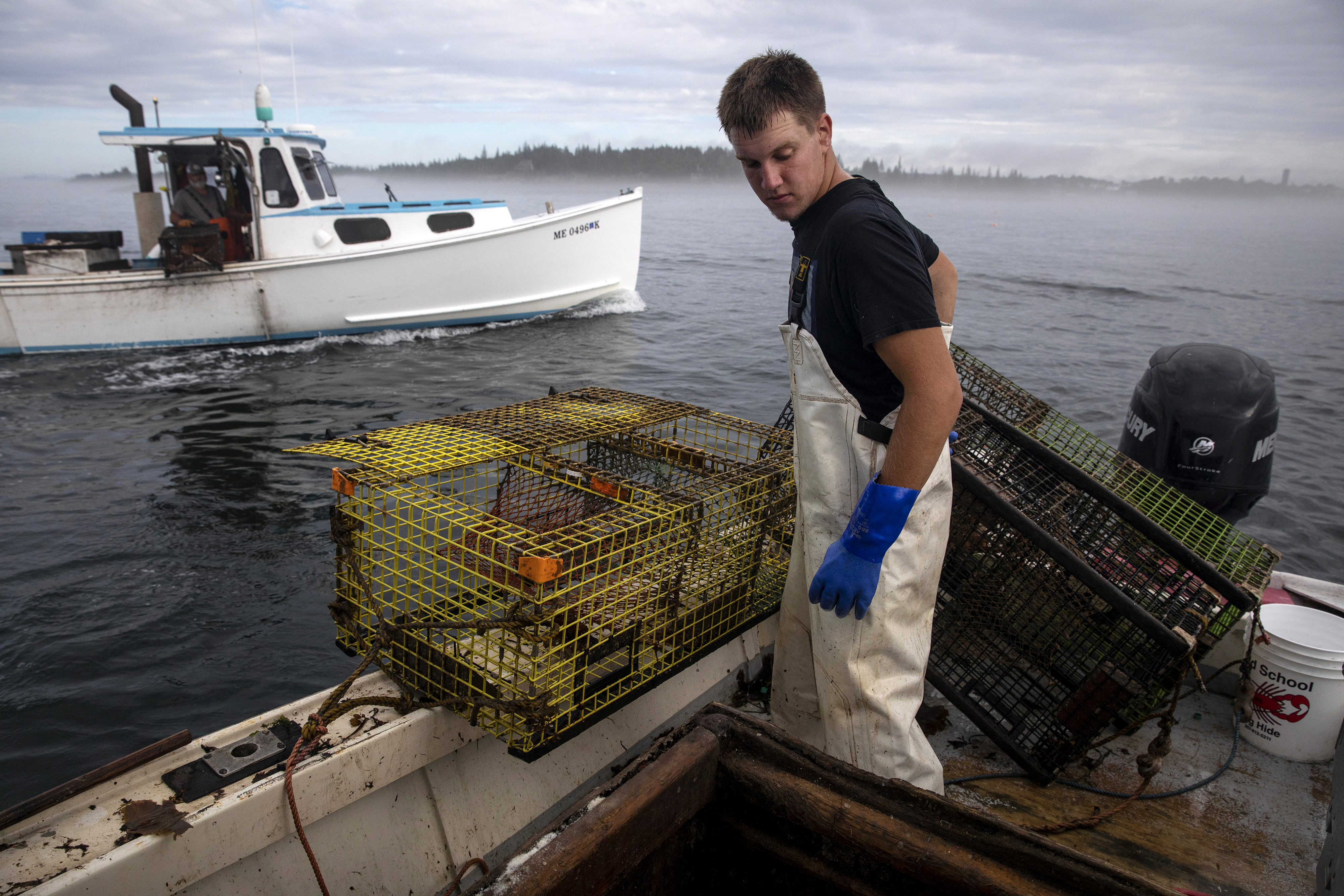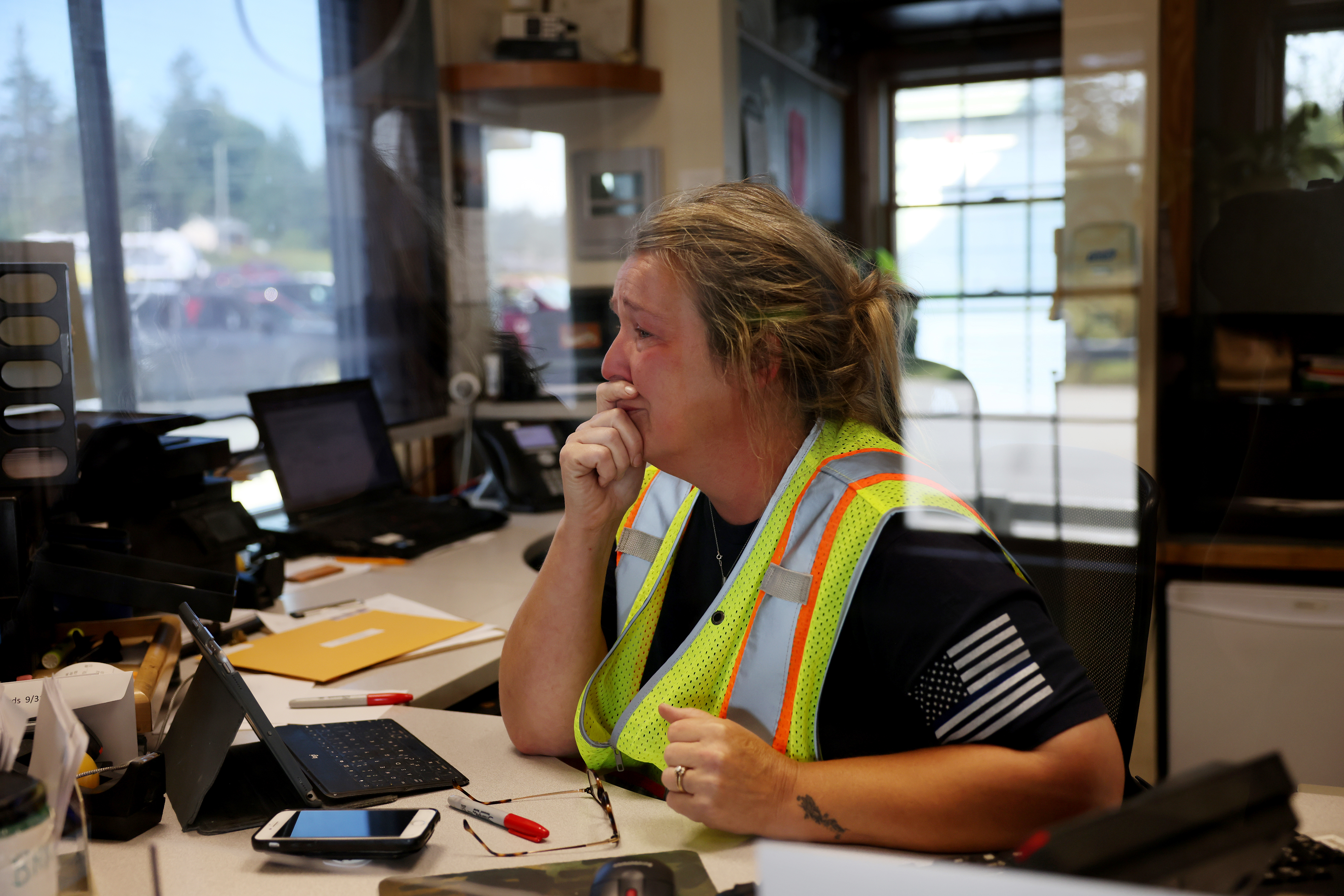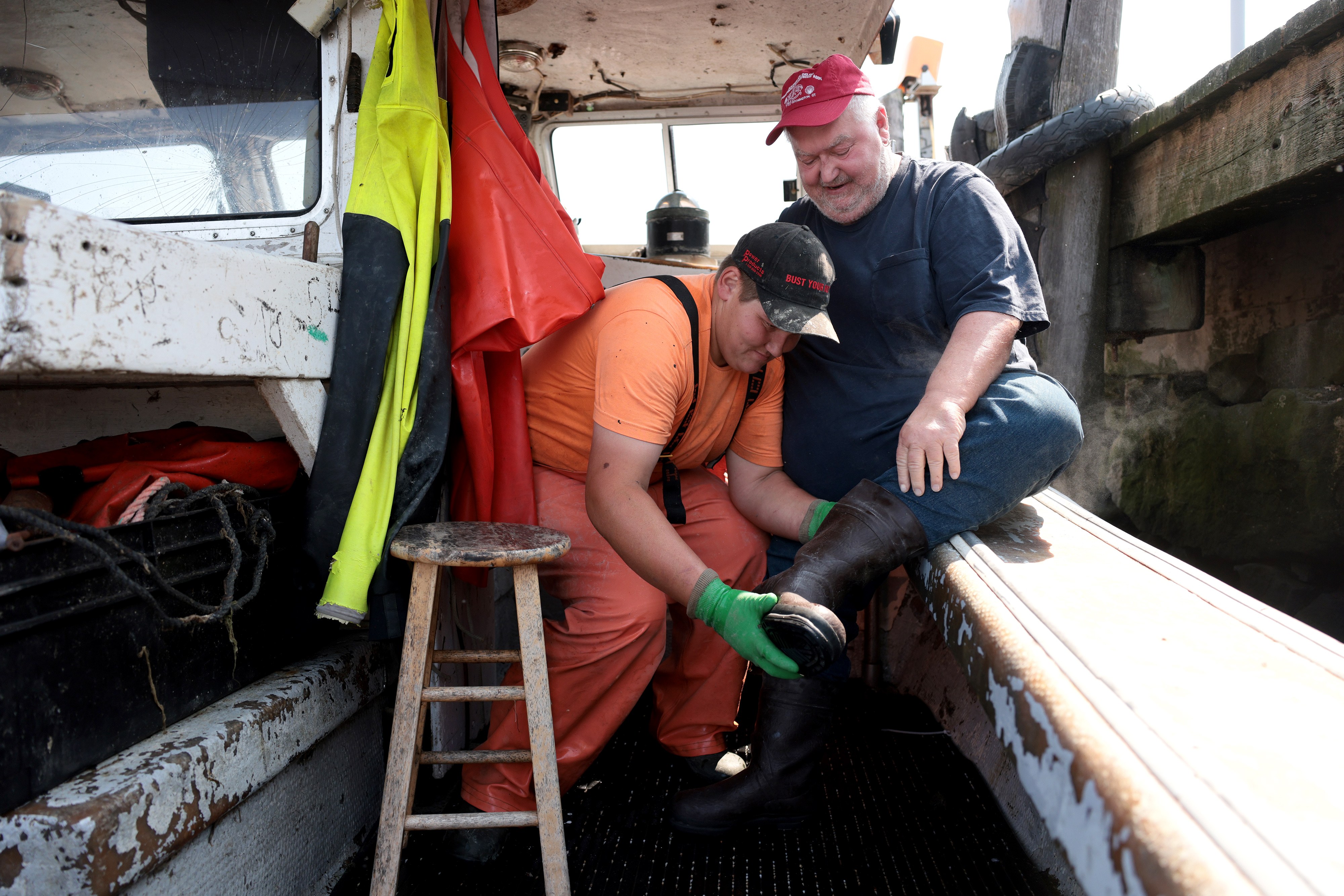The plentiful catch that brought wealth to fishing families is at risk, as climate change warms the Gulf of Maine. A way of life is on the line, but lobstermen can’t, or won’t, imagine another.
VINALHAVEN, Maine — A hard rain falls all around Johnny McCarthy, beading across the sprawling deck of his brand-new lobster boat, as he steers around the hidden threat of Folly Ledge through an ink-black night and into his home port.
His journey this midsummer night is momentous: a maiden voyage on the boat he’s always dreamed of, from the boatyard where her hull took final shape to the harbor where their fates will be made together.
You’d never know it to meet McCarthy — an unassuming, soft-spoken man who goes to work in a T-shirt and waterproof oilskins — but he is, at 32, among the most successful lobstermen in a place where lobster is king. On this remote and rocky island, 15 miles offshore, virtually everyone from the grocery clerk to the family doctor traces their living back to the tanks full of lobster that these boats haul into port each day.
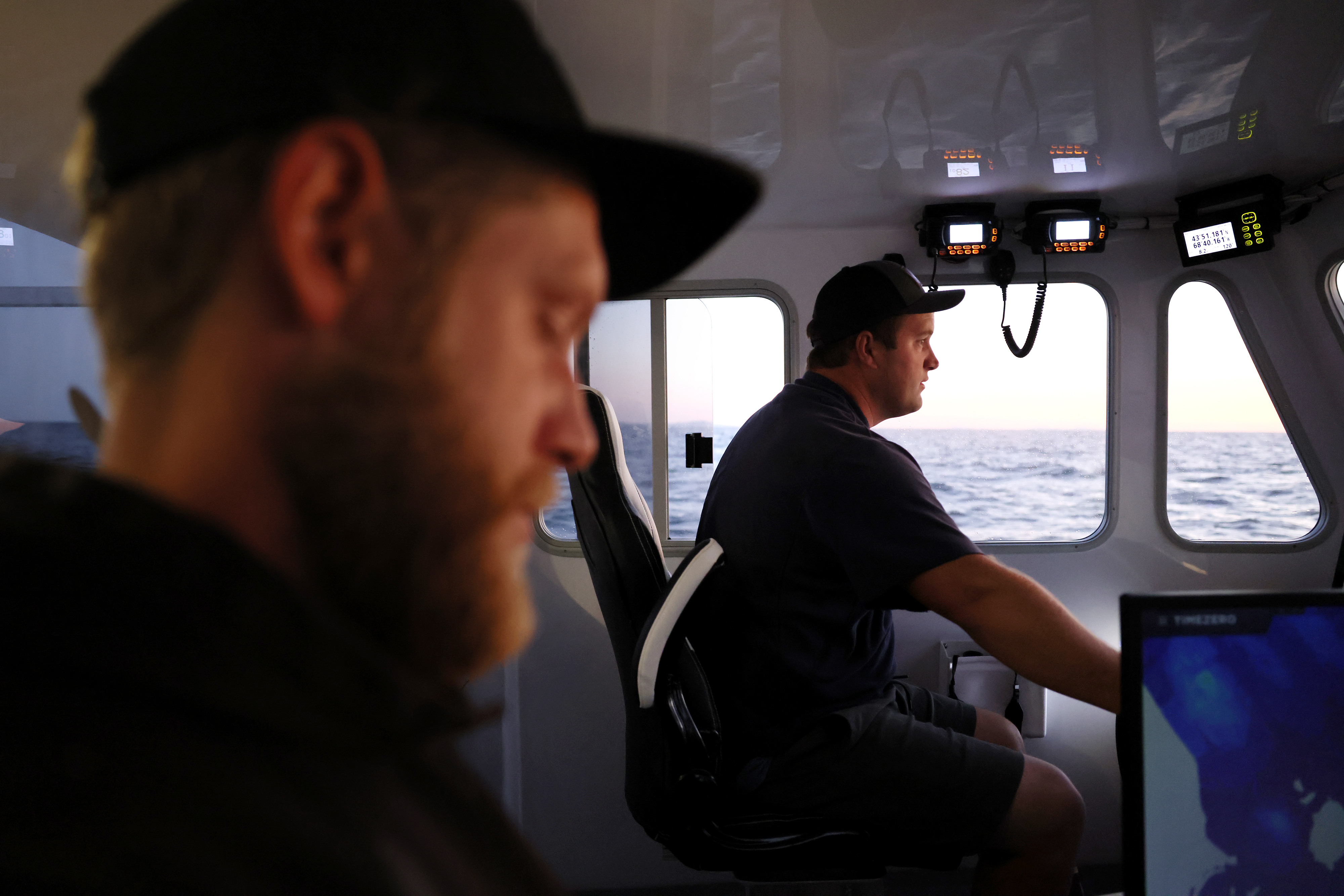
The Gulf of Maine has been kind to McCarthy and his neighbors. The vast expanse, which stretches from Cape Cod to Nova Scotia, is one of the fastest warming ocean territories on the planet — and, for 30 years, that trend worked in Vinalhaven’s favor, turning the waters that surround the island into a near-perfect nursery for lobster. It is now the state’s second-richest port, and hard-working men and women like McCarthy have joined Maine’s one-percenters, pulling in hundreds of thousands of dollars per year in a state where the average worker earns about $32,000.
McCarthy’s decision to invest in a new $650,000 boat — a gleaming, green-hulled fiberglass beast, 45 feet long and the envy of every captain in Vinalhaven’s 200-boat fleet — was a vote of confidence that the good times would continue. At least it was when he made the down payment three years ago.
That was before the coast of Maine became a front line in the battle over climate change.
Lobsters, which make up the nation’s second-most valuable fishery, are sensitive to temperature, preferring the chilly North Atlantic to southerly waters. Since the 1970s, the epicenter of the lobster population has shifted more than 100 miles to the north as the Gulf of Maine warmed. That brought new prosperity to Maine coastal villages, while in southern New England, lobster populations and profits dwindled — and, in some places, all but vanished.
Vinalhaven need only look to the south to see how Maine’s boom times could end. In the once bountiful waters off Connecticut, a single full-time lobsterman remains — but today he fishes in a watery graveyard. The lobster catch has also waned in the hard-hit fishing ports of Rhode Island and the south coast of Massachusetts.
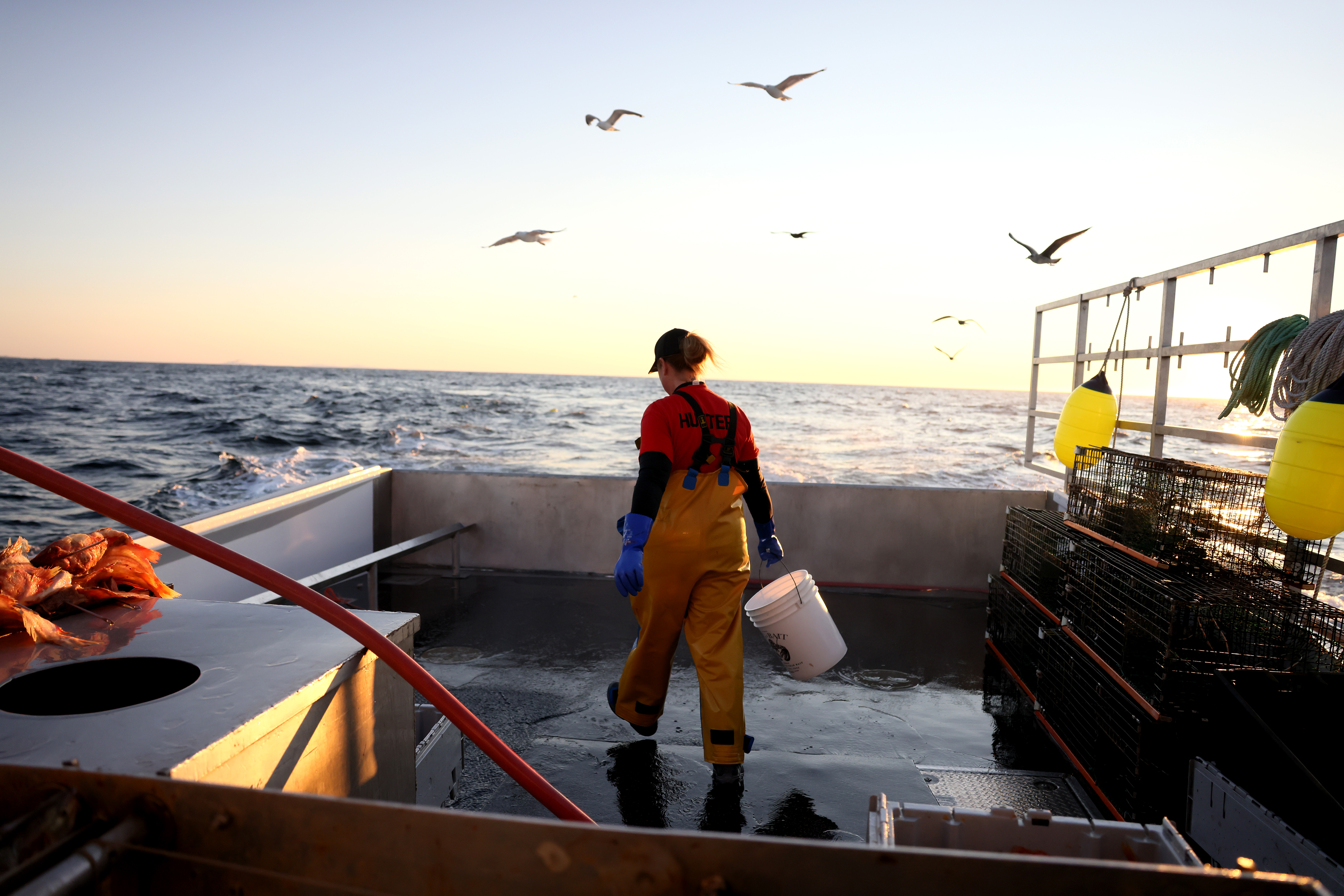
Maine lobstermen caught less in 2019 than in any of the last 12 years — down about 23 percent from the 2016 high. The downturn continued last year, when the catch in Vinalhaven’s county, the heart of Maine’s lobster industry, was the smallest in more than a decade, in part because demand fell in the pandemic. Insiders say preliminary numbers suggest a rebound this year, but the inconsistency has some worried about what lies ahead.
Policymakers have begun to talk about emergency measures, even life post-lobster — a life McCarthy can’t envision, and one his town and state cannot imagine.
Meanwhile, to the north, beyond Maine’s border, Canadians are fighting — with fists, fire, and knives — for valuable nautical territory as they eagerly prepare for their own lobster boom to reach new heights. They know the future belongs to them.
But Maine lobstermen don’t have the luxury of worrying solely about long-term problems: They face a much more immediate assault on their livelihood. Long before the lobster population shifts to Canada, US government efforts to manage the impact of climate change could well throttle their massive lobster business.
The climate disaster that Maine fishermen dread is not some far-off, half-formed threat. It’s here. As he steers his new boat home on a rainy July night, McCarthy knows that disruptive change is just weeks away. The government is set to issue sweeping new restrictions on lobster fishing to protect the critically endangered North Atlantic right whale, whose temperature-sensitive food supply has been disrupted by global warming.
As they roam new routes in search of food, more whales are suffering injury or death resulting from entanglements in fishing lines, the ropes that stretch from traps on the sea floor to buoys floating on the surface. The growing risk to the whales, which now teeter on the brink of extinction, is driving a crackdown on lobstermen, the most catastrophic fallout they have faced to date as an indirect result of climate change.
Percent change in pounds caught, 2020 to 1980
Area covered by 19 inches of sea-level rise
Warming waters threaten a way of life
All this weighs on Johnny McCarthy as he stands at the helm of his custom-built boat, christened hours earlier. What was supposed to be a triumphant, purely joyful homecoming is now more ambiguous, even worrisome.
McCarthy has a boyish, pink-cheeked face, with laugh lines beginning to show, but describes himself as an old man in a young man’s body — cautious, methodical, almost plodding, considering a problem from every angle before making a decision. But on this of all days, cracking a beer with his dad while his kids play on deck and his mother dances to the Allman Brothers, he doesn’t want to worry.
“For a fisherman, launching a new boat is like having a baby,” he says. “It’s something a guy like me is lucky to do even once. ... On launch day, I don’t want to worry about tomorrow.”
McCarthy is practical-minded, a businessman through and through. That’s how he worked his way up, from a hungry 13-year-old setting his first traps to a leader among Vinalhaven’s captains. He knows the climate is changing, and fishing will have to change, too. But he also knows how dearly it will cost him if he chooses to adapt, by going along with the government’s rules.
In the next decade, regulators will demand that lobstermen like him, who fish in federal waters, switch to a brand-new type of gear that minimizes risk for whales, by eliminating vertical ropes that can ensnare them. The change may be inevitable, but for now, most fishermen vow that they will never try it — even that small step, they say, would be a surrender.
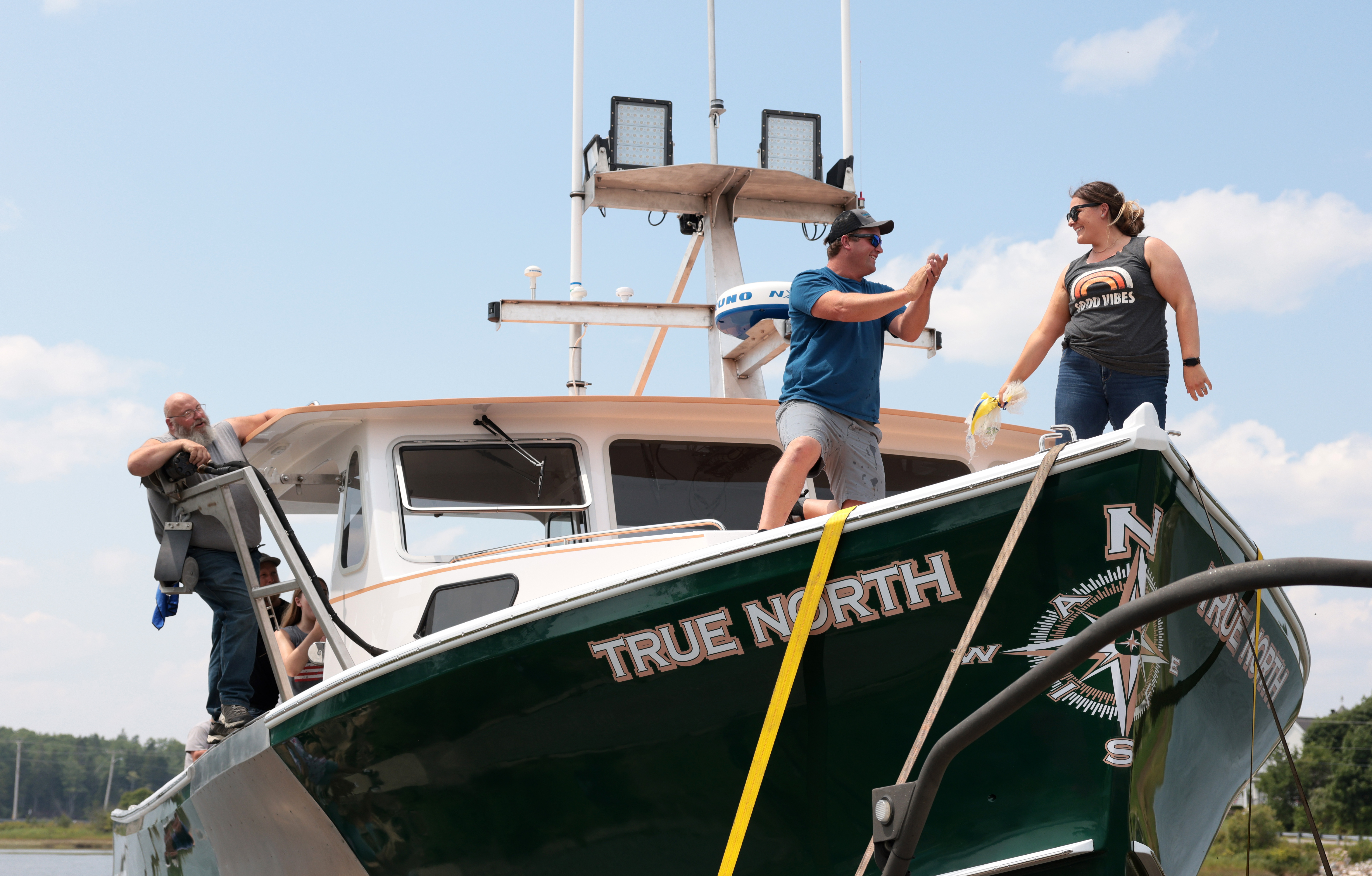
Many of his fellow fishermen have vowed to fight the coming change at any cost. It feels almost impossible to McCarthy that he would break from this united front and stand alone.
In a place defined by tradition, isolated from the world and wary of outsiders, there is little tolerance for nonconformists, or anyone who thinks they are smarter or better. The place demands loyalty: At the end of the day, when the last ferry steams away, they have only themselves to turn to. Everyone here needs everybody else. And they know how to punish those who strike out on their own.
McCarthy’s will be one of the only new fishing boats brought home to Vinalhaven’s fleet this summer. The vessel boasts more deck space to stack traps, more storage for his valuable catch, and a bigger cabin; its greater size and stability will let him fish a longer season in rougher, more dangerous winter weather when lobster prices are usually higher, helping him pay down his debt and save for an uncertain future.
Yet amid the congratulatory backslaps, there are doubting whispers on the docks, even among those who deny any threat to their livelihood: Gonna take a lot of lobsters to pay off that boat. That’s a big risk. What’s Johnny thinking? Some nights, writing in the pages of his journal, he asks himself the same question.
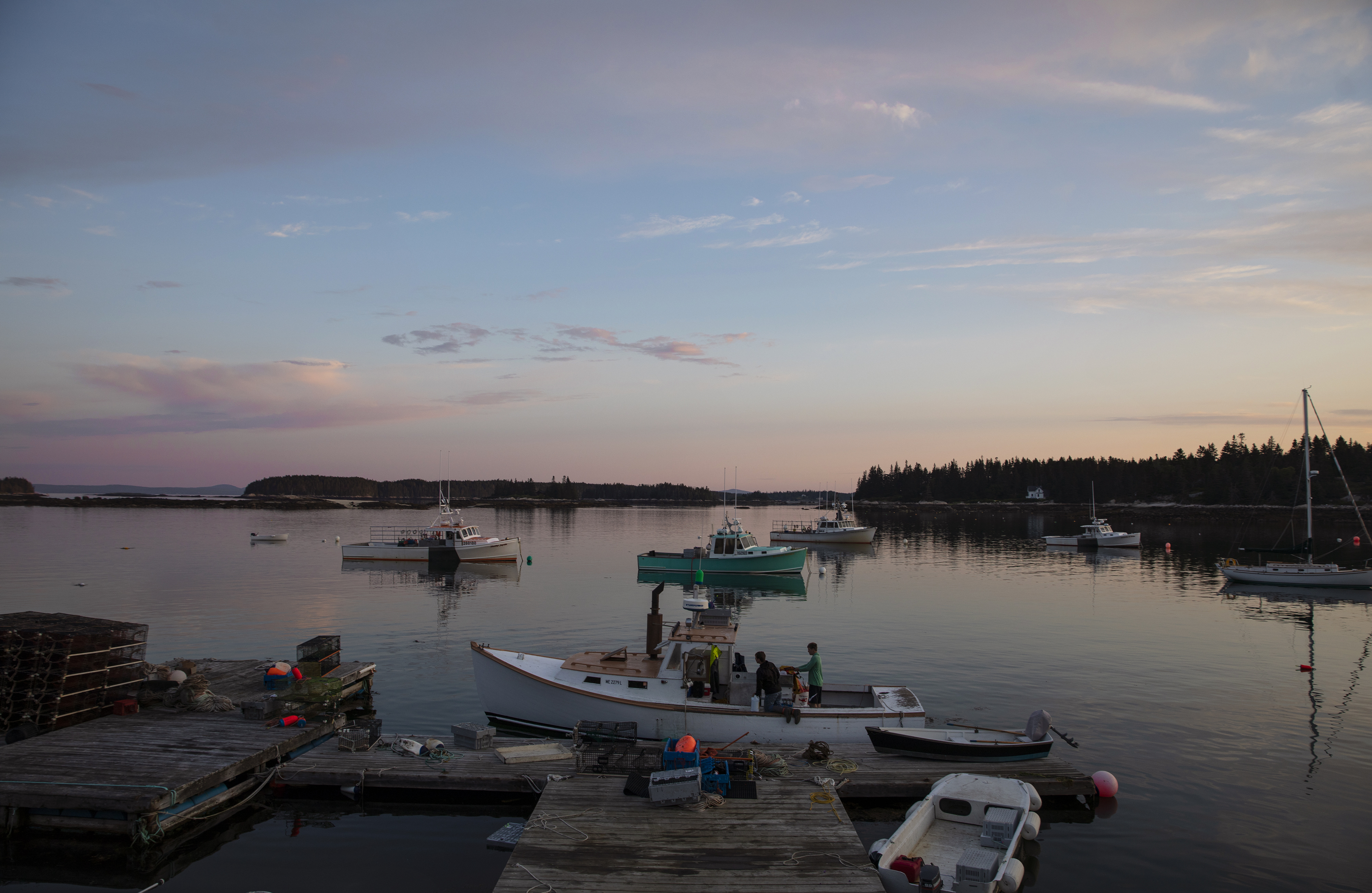
He seeks comfort in the island’s favorite platitudes: No one can predict the future. Even scientists can be wrong. But he can’t deny the anxiety that grips him.
“I’ve got to make hay while the sun shines,” he thinks, “because it may not be shining a whole lot longer.”
As his new boat glides into spruce-fringed Carvers Harbor, the ocean beneath her hull is warmer than ever recorded this time of year, nearly 4 degrees higher than the 20-year average. The data will pile up all summer, a stream of steady blips confirming the trend, sent from a scientific buoy floating three miles west of Vinalhaven that records the water temperature at hourly intervals.
Quietly, warily, some on Vinalhaven are preparing for its uncertain future. The proactive young town manager conspires ways to train lobstermen for new careers, though the fishermen would likely be affronted by his efforts. The small but determined Sea Level Rise Committee plots rising tides to project the toll of ocean warming, mindful that talk of climate change can still spark a backlash.
Every reading from the scientific buoy makes it harder to deny the world is warming. Yet many on this island of 1,200 still deny it, their complicated responses to climate change — disbelief, anger, grief, resistance — mirroring those of people everywhere. All the world, in different ways, is facing the same choice: to come to terms with life-altering disruption and adapt, or to turn away.
For McCarthy and his island peers, the choice is agonizing. At stake is the only life they have ever known and the future they have long imagined for their children.
With his 9-year-old son, Jack, beside him, McCarthy taps the throttle and powers on toward home. Soon after dawn arrives the next morning, he will steer back out across the dark and warming ocean, on a quest to catch Maine lobster while he can.







On one of the first warm days of spring, Frankie Thompson worked the crowd outside the civic center in Augusta, rallying the passions of these angry, weary fishermen as only he can. Even those who dislike this Vinalhaven firebrand respect his experience, which has spanned five decades of fishing from Gloucester to the Canadian border for everything from cod to slime eels to lobster.
“I don’t trust environmentalists, scientists. Not the government,” said Thompson, his voice growing louder, his tone more strident, as he launched into his favorite sermon. “Do they ever ask those who work on the water what we see, what we know? They do not. They say we’re greedy, stupid. … But we care about that ocean more than they ever will.”
Four hundred Maine fishermen gathered here that morning in April, during a session of the Maine Legislature, to protest offshore wind power development — a trend they see as another threat to their livelihood. Thompson, the hardened, 65-year-old cofounder of the Maine Lobstering Union, was in his element, shaking hands as protest organizers cranked up Johnny Cash’s “Ring of Fire” and Garth Brooks’s “Friends in Low Places.”
Thompson is an old school arm-twister, a loudmouth who actually talks softly, a bully who gets tough so others can keep their hands clean. Meticulously dressed and groomed, even when working on the docks, with thick graying hair and a movie star cleft in his chin, he has raised two sons on Vinalhaven. Both lobster; one is also a town selectman. Thompson is the voice of resistance, the force behind the “hell, no” crowd, who insist they will not go quietly into a future where lobstering is regulated out of existence.
Thompson doesn’t buy what the scientists are selling. He dismisses climate change, believing instead that the ocean’s recent warming trend will reverse again in time as part of a natural cycle. He rejects the premise that giant turbines should be built in prime offshore fishing grounds to produce sustainable energy. And he rails against the environmentalists who say Maine lobstermen must remove all the rope from their gear to save the North Atlantic right whale from extinction.
Why, he asks, should his island sacrifice its livelihood, when scientists have shown no proof that Maine lobstermen are killing these whales?
Two years ago at a meeting in Waldoboro, he stood in front of a crowd of angry lobstermen and told Maine’s fishing commissioner to “get a backbone” and resist more whale protections.
“I’m a fighter, no two ways about it,” Thompson said this summer. “I came out fighting. Been a fighter every day of my life. Pretty sure I’ll fight all the way to the grave.”
Thompson and Johnny McCarthy would never call themselves rivals, and yet, with clashing styles of leadership, they represent a fundamental schism within the lobster fishing community. McCarthy, the younger of the two, is a member of the older, more traditional Maine Lobstermen’s Association, while Thompson helped start the Maine Lobstering Union, a more confrontational group. The two men, who haul in some of the island’s biggest catches, also led competing lobster-buying businesses until recently.
If McCarthy is one kind of rarity in this universe — a businessman willing to consider adapting to survive — Thompson is the opposite extreme: a warrior willing to sacrifice his livelihood as an act of defiance against the forces that would change it.
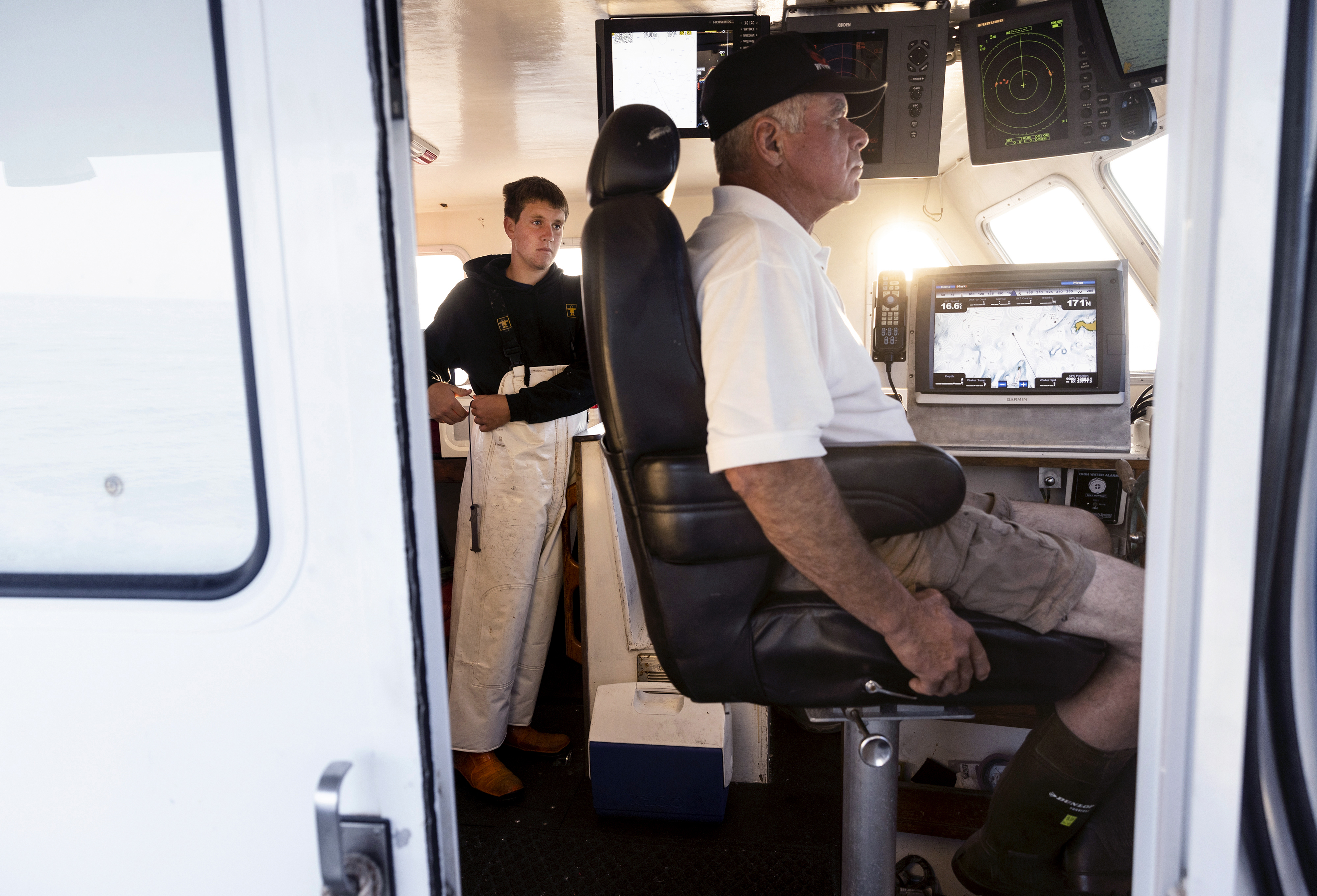
His boat, Obsession, is Vinalhaven’s biggest at 57 feet — a dozen feet bigger than McCarthy’s new vessel — and his family lobster-buying business helps drive lobster prices on the island, and beyond. Feared and revered and frequently consulted, he is a kind of legend on this coast, where his obstinate resistance sometimes appears to be the last line of defense between a way of life and oblivion.
Trailing behind Thompson at the protest that spring morning in the state capital, absorbing his mentor’s every word, was Tanner Lazaro, a lanky, wide-eyed teenager in a hoodie. Tanner works on Thompson’s boat and idolizes the captain. This was Tanner’s first political protest, and he felt a realization dawning: The future of Maine lobstering — his future — is under assault.
Together, Thompson and Tanner stood three rows back from the stage as Andrew Dorr, Vinalhaven’s town manager, urged state lawmakers to listen to the lobstermen and protect the state’s $1.4 billion industry.
“I’m here today to insist the people that are part of the long heritage and protection of the ocean be given a voice,” Dorr told the crowd. “This catch adds so much to this state economy. It cannot be compromised.”
The fishermen roared in approval.
Across the springtime shimmer, though, a shadow fell. The whale regulations were coming soon, whether they liked it or not. This summer could turn out to be an ending, the last days of lobstering in Maine as they have known it.
So they listened to Thompson, to keep hope alive. That they can resist. That tradition will prevail.







To an outsider arriving on the ferry from the mainland, Vinalhaven looks like a Maine postcard. Its luminous blue waters are dotted with colorful buoys, its harbor teems with boats. Boxy houses crowd around the waterfront like a child’s drawing.
Behind the pretty scenery, though, island life turns rougher. The boats can stink of diesel fuel and rotting bait. A few proudly fly flags bearing the F-word and the president’s name. Porches sag beneath the weight of rusty lobster traps covered in barnacles and stacked six and eight high. Sternmen and dock workers who can’t afford a rented room sleep in their bosses’ campers and trailers, and in boats with no heat or running water.
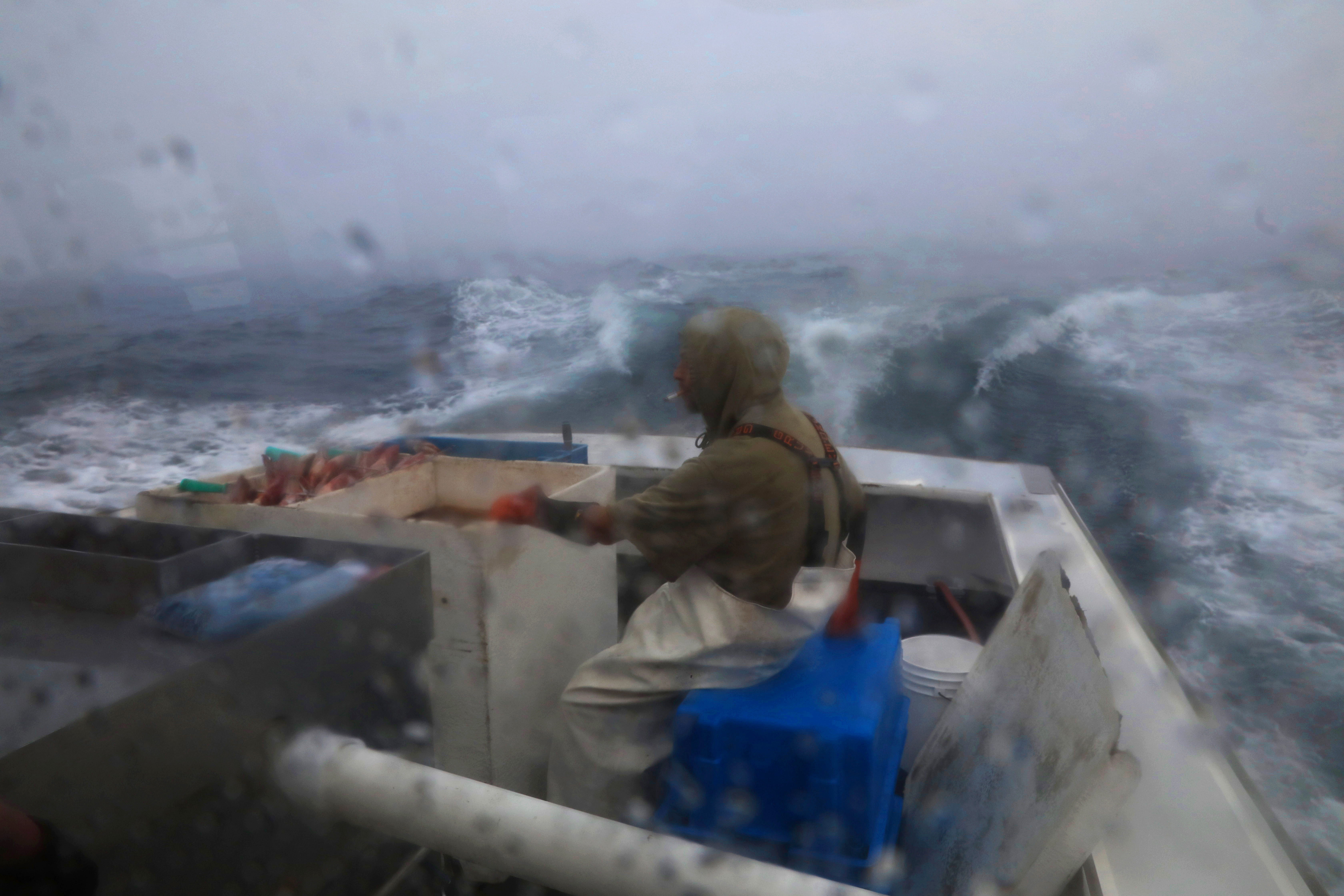
Their work is endlessly repetitive, backbreaking, and dangerous: hauling up trap after trap, emptying each of its catch, and refilling it with bait before sliding it back into the cold Atlantic. Injuries are common, as is chronic pain; opioid abuse courses stealthily through their ranks.
Most of the time, the year-round residents try to get along, but resentments simmer and sometimes spill over. There are fierce bar fights and drawn-out turf wars, often sparked by clashes over who can fish which waters. Unofficially, lobstering territory is handed down and parceled out by intricate, unwritten rules; those who violate the code do so at their peril.
Deadly violence is very rare, but not unheard of.
In June 2020, a 28-year-old newcomer to Vinalhaven was killed in a late-night brawl outside another man’s home — from wounds inflicted by an ax, according to witnesses. The dead man’s girlfriend said the feud between the two men began when they competed for a lucrative job on a lobster boat, where reliable sternmen can earn $80,000 per year for hauling traps.
After the outsider, Roger Feltis, scored the coveted position, another man who didn’t get the job allegedly harassed him for months and eventually cut the brake lines on his truck. When Feltis went to confront the man at his home, he ended up dead. But a sheriff’s investigation quickly sputtered out, despite a carful of eyewitnesses, and a grand jury issued no indictment.
It was the first homicide in more than 30 years on Vinalhaven, an island policed by a lone sheriff’s deputy — and a rare glimpse into a rough-and-tumble culture rife with danger, recklessness, and money.
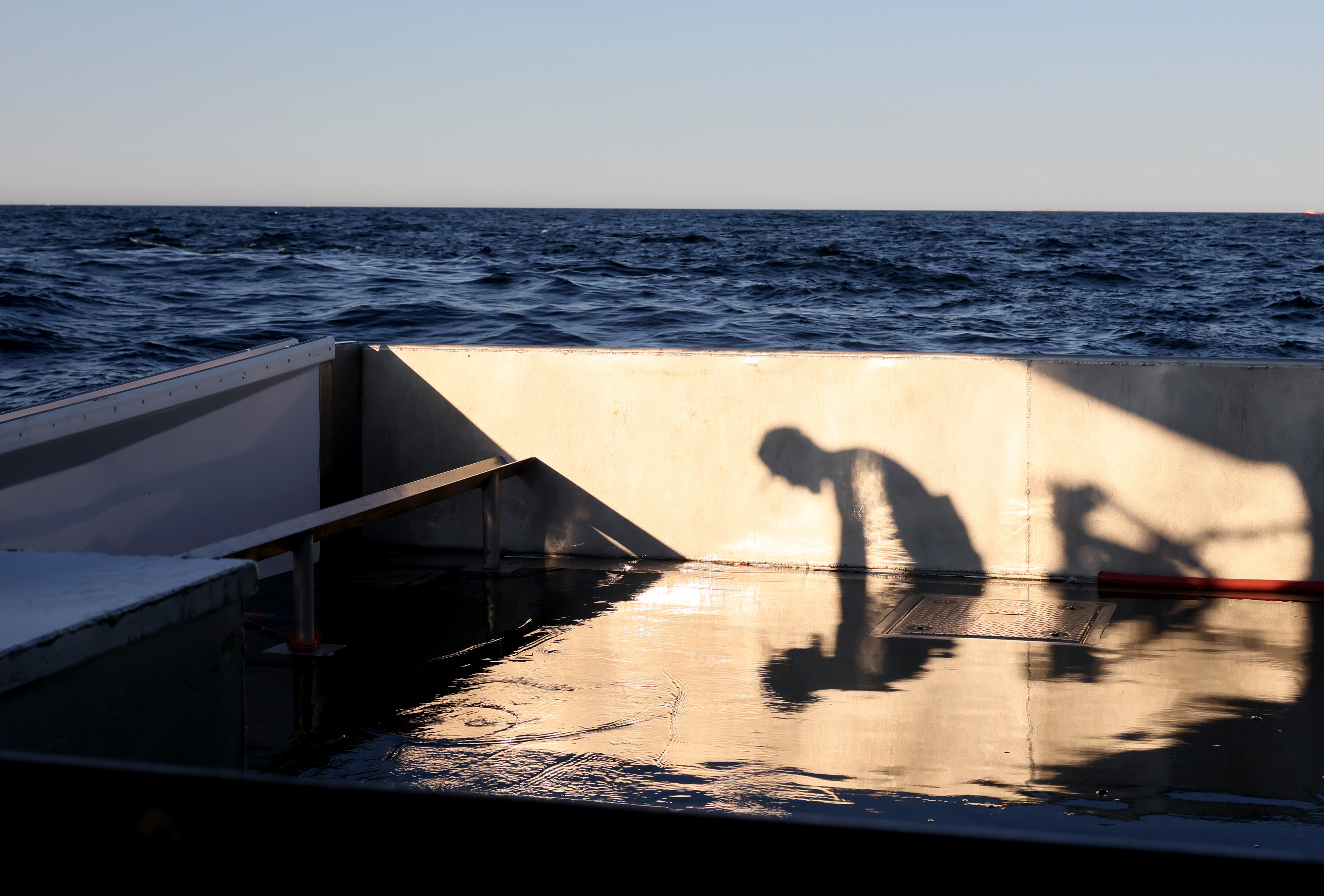
The lobster boom of the last 20 years allowed Vinalhaven to claw its way out of the poverty that set in after the island’s prosperous granite quarries closed. The statewide catch surged from 57 million pounds in 2000 (valued at $188 million) to 97 million pounds in 2020 (valued at $406 million). And a grueling fight to survive gave way to perks and privileges: Florida vacations, home renovations, and a parade of new trucks and four-wheelers.
The top 20 lobstermen on the island had landings worth an average $579,000 apiece in 2019, placing them among the state’s wealthiest residents, even with their staggering bait and fuel bills and hefty shares paid to sternmen.
The wealth inhibits talk of climate change and of the dimming prospects for Maine’s lobster population. No one wants to hear that the good times will end. To acknowledge that likelihood is a kind of sacrilege — a betrayal of island life itself.
“Fishermen love what they do, and have it in their blood, and it hits them hard when the way they do things is threatened,” said Sam Belknap, a community development officer at the Island Institute, a Rockland-based nonprofit that supports the state’s coastal communities. “They’re not interested in retraining, in new skills. They want to keep doing what they know how to do.”
This is not good news for Dorr, the town manager.
His job, or an important part of it, is to look out for this island’s future. As town manager, he answers to the board of selectmen, but it often falls to him to start the hard conversations that few on this island want to have, about climate change and lobster and what must happen now to ensure the town’s survival.
A 34-year-old transplant from upstate New York, Dorr is a doer, a master multitasker whose practical nature demands forward thinking. He wonders if fishermen could be retrained for jobs building the offshore wind farms they despise. And months ago, as he learned more about regulators’ plans for protecting right whales, he began researching a new kind of fishing gear and hatching a plan for the town to buy or borrow some. Then, Dorr imagines, they could loan the so-called ropeless gear out to the island’s lobstermen, so they could start to grapple with the change that looms ahead, as regulators try to eliminate the ropes that connect buoys to traps — the same lines that can ensnare whales.
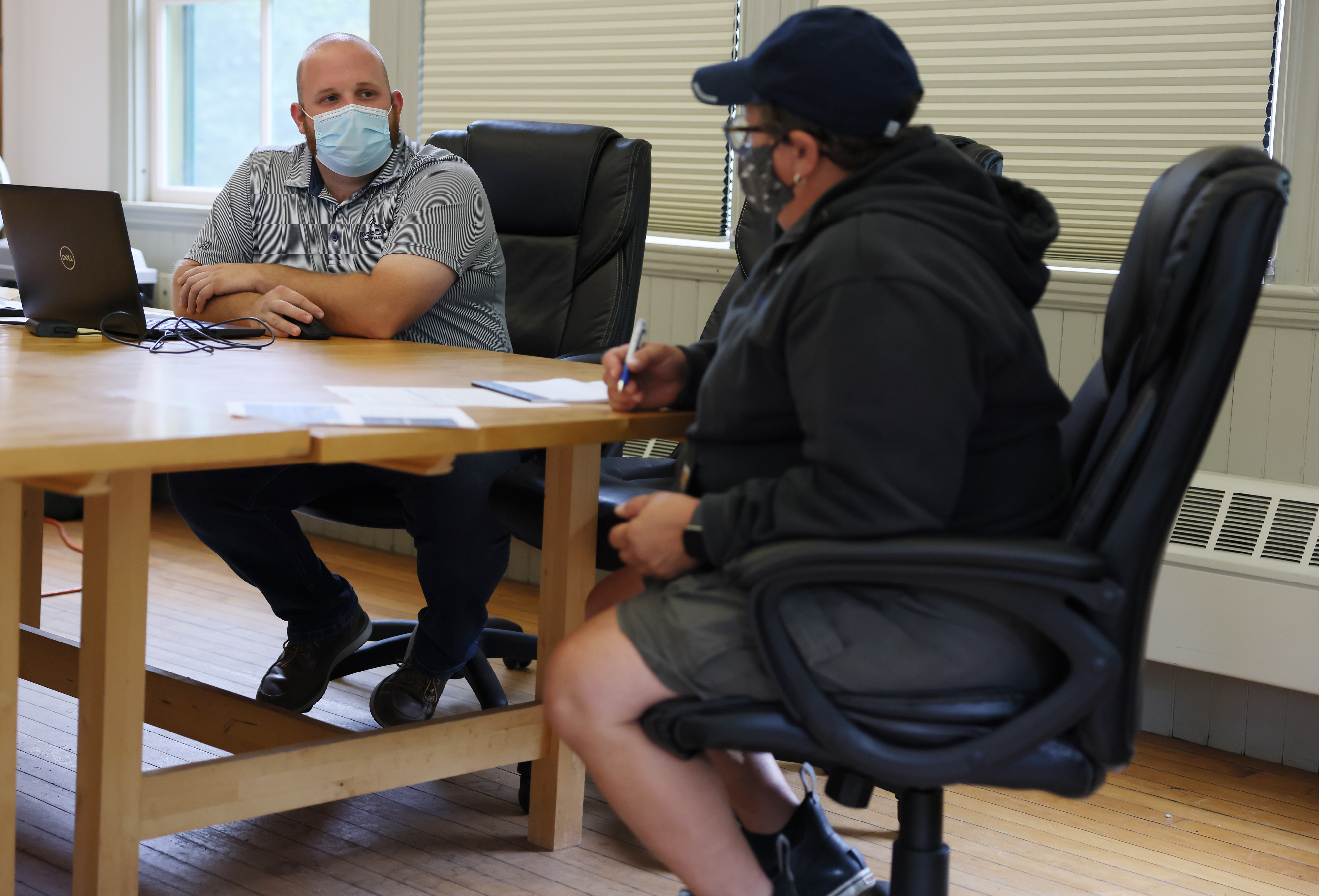
“My thought is, let’s get the gear here, and try to make it work,” Dorr said.
But no one wants to be the lobsterman who tries it first — and signals to the government that this adaptation might work. Such a move would be seen as a betrayal by Thompson and the rest, a breach in their wall of denial and resistance.
“It would be like waving a white flag,” Thompson said.
Dorr has a bachelor’s degree in environmental studies and no delusions about the seriousness of global warming in a place where Main Street — home to almost every business on the island, from the grocery store to the post office — is just a few feet above the rising sea. A study by the Island Institute found that by even the government’s most conservative projections, the Gulf of Maine will rise by at least 19 inches by 2050, breaching 30 homes and 20 businesses on Vinalhaven’s Main Street.
He understands why some islanders are struggling with what lies ahead. But he can’t sit around waiting to see how bad it gets. He has to prepare.
Dorr hoped the new regulations that would drop by summer’s end — whatever the details — would turn out to be a catalyst, a painful push that spurs more fishermen to face the future and find a way forward.
“If it’s a 10-year timeline until they have to go ropeless,” he said, “that gives us five years to figure it out, and five to implement it.”
But there is only so much he can do without the fishermen behind him. Nature is one inscrutable force. The will of the islanders, Dorr knows, is yet another.
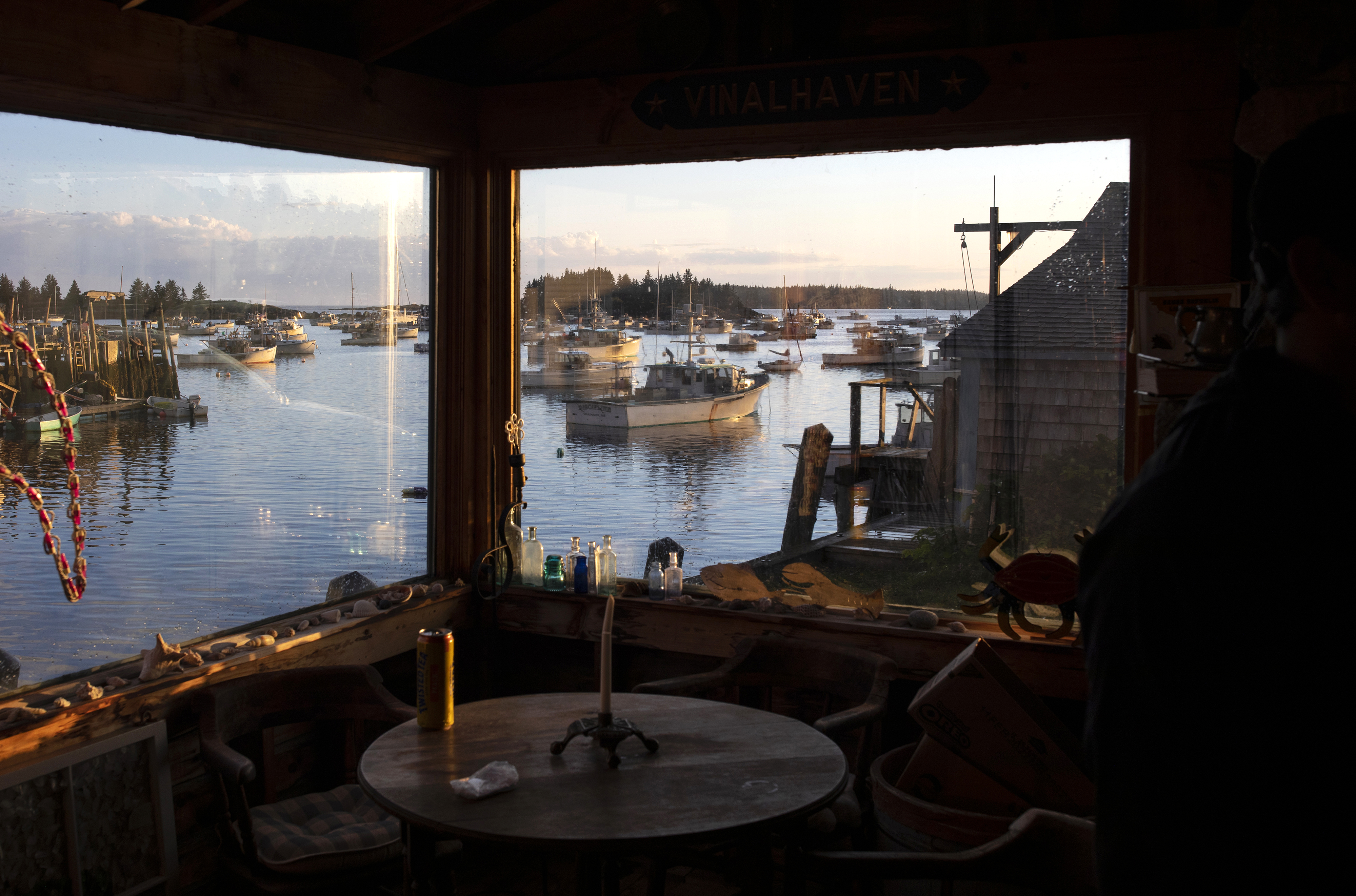
Across the planet this summer, from fire-ravaged California hills to a German valley swept away by floods, the effects of climate change bore down with cataclysmic fury. At stake is everything we care most about: Our homes and health. Our food supplies and livelihoods. The safety of the world our children will inherit.
Off the rugged, eastward-leaning coast of Maine, in a landscape as wild as any in America, the changes underway remain mostly unseen. Bristly firs, blurred by fog, rise like masts from layered granite ledges. Gulls crest and dip on wind currents overhead. And as dawn pinks begin to streak the sky, Vinalhaven’s lobstermen strike out for deep water.
The lobsters they stalk across Penobscot Bay and beyond are more than just a way to pay bills and get rich. Lobster is a critical economic underpinning of this sprawling state. Far beyond the thousands it employs directly, the fishery generates another 35,000 jobs for dock workers, dealers, truckers, and processors, plus hundreds of bait dealers, trap makers, and boat builders, mostly in remote towns and villages along a 3,500-mile jigsaw coastline with few other options for employment.
In these far-flung ports, the sons of sons of lobstermen try to guard a unique way of life, hoping that the future challenges they face somehow turn out to be a myth. They push away the questions they cannot begin to fathom: What will we do — who will we be — when we can no longer lobster for a living?
Over the last 30 years, the Gulf of Maine has warmed by more than a 10th of a degree Fahrenheit per year, three times faster than the global average. And the pace is picking up: For the last half of that period, the gulf has warmed at seven times the global average.
Lobsters thrive in waters between 54 and 64 degrees and can remain healthy up to 68 degrees. Long-term exposure to warmer temperatures compromises their respiratory and immune systems and can lead to shell disease, a condition in which bacteria that normally live on a lobster begin to eat away at its shell. While rare in Maine, the problem has become prevalent in areas off the coasts of Massachusetts, Rhode Island, and Connecticut.
Global warming has upset the ecosystem, the turmoil cascading up the coast.
Northern shrimp were once a winter delicacy, but the 2012 marine heat wave — the same one that jump-started the lobster boom — lured a new predator to the Gulf of Maine, a squid that eats shrimp. Now the shrimp stock is in tatters, 10 percent of its former size, and the $8 million fishery is closed.
Meanwhile, warming, increasingly acidic waters have stymied attempts to help Maine’s cod population recover from decades of overfishing. Thirty years ago, the catch routinely topped 10 million pounds. Last year, fishermen netted a mere 59,000 pounds, the smallest harvest on record.
Researchers have just started to study the impact of ocean acidification on lobsters. But because more acidic oceans contain less carbonate, the element that helps lobsters to grow shells, researchers believe young lobsters may have a harder time protecting themselves from predators in warmer seas.
Climate change is also propelling right whales nearer to fishing boats and shipping lanes as they pursue their disrupted food supplies. The food shortage, combined with gear entanglements, is slowing their rates of reproduction, leading to an unprecedented zero births in 2018. A recent rash of whale deaths, mostly in Canadian waters, will usher in much stricter restrictions on fishing off New England’s coast — threatening the survival of lobstermen, who must adopt far more costly ways of fishing.
As Vinalhaven awaited the new regulations due at summer’s end, the mounting pressure and uncertainty fuel anger and frustration. So much depends on the fishery’s survival: One sternman on McCarthy’s boat, Kelsey Barker, is a single mom who just purchased her first home. The other is a new father. McCarthy’s eldest daughter may soon face college bills. And then there is the brand-new boat that must be paid for.
McCarthy’s wife, Ali, pushes doubt away. “If anyone can win this bet,” she says, “it’s Johnny.”
Her conviction is edged with defiance, and the hint of an unspoken challenge: Try and stop him.
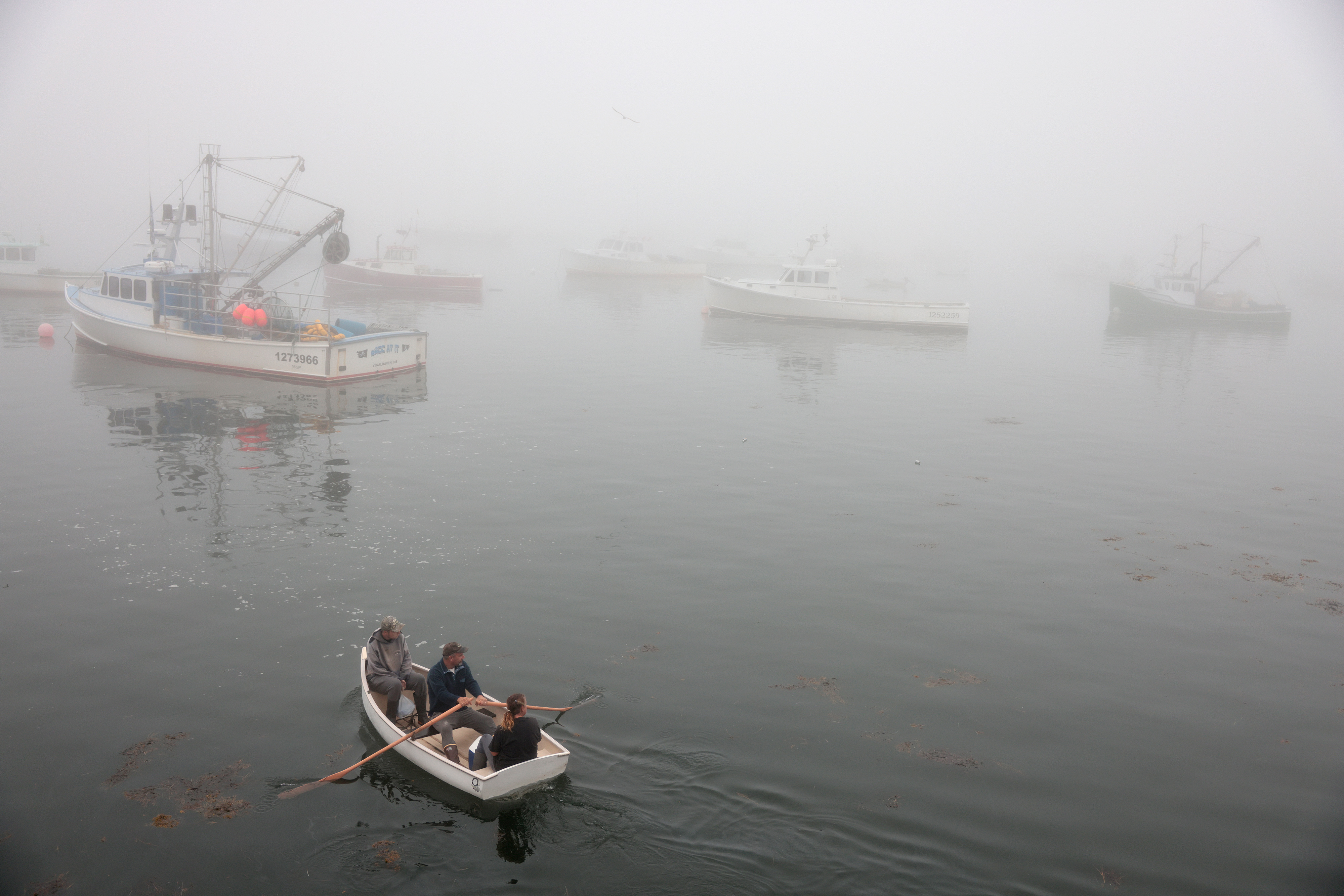
On the Fourth of July, red-white-and-blue bunting covers the island’s tiny downtown, where locals sell chowder and blueberry pie in a parking lot by the harbor. Nearly everyone — year-rounders, summer people, weekend tourists — flocks to Main Street for the annual parade, a slow, boisterous procession of lavishly decorated homemade floats and local kids in costumes, accompanied by a fire engine and the island’s one Little League team.
McCarthy feels unsure, on a day of celebration, about bringing politics to the parade. This holiday marks the unofficial start of summer and the last lull before the lobstermen’s summer sprint begins, a critical profit-making stretch of 10- and 12-hour days and six-day weeks. McCarthy isn’t one to stir up controversy, and he already feels exposed, with so much attention being paid to his new boat.
But his wife, Ali, is bolder. She insists that their family parade float be more than just a picturesque ode to lobster fishing. She makes the signs herself, carefully printing the words, large enough to read clearly from a distance. “The future of Maine’s lobster industry is in jeopardy!!” says one. “Maine lobster gear is not harming right whales!!” reads another.
She hangs the signs on the miniature plywood lobster boat that McCarthy built for his young son Jack as a Christmas present. Jack is riding on the float in the parade, dressed as a pint-sized fisherman in his rubber oilskins. McCarthy will tow the float down Main Street with his four-wheeler, while Jack waves from on top, and Ali watches from the crowd by the brick post office.
The last sign she adds refers pointedly to young Jack: “Protect Maine’s lobster fishery for future generations!”
The crowd’s reaction is warm and approving, and McCarthy begins to relax, while Ali beams at her neighbors’ compliments. She is more outspoken than he is, tough and capable, with muscled forearms and camouflage leggings. She is involved in all parts of his business, keeping the books and calling out the politicians and organizations that she believes threaten it, in between raising three children, chairing the island school board, and running her own small sewing business.
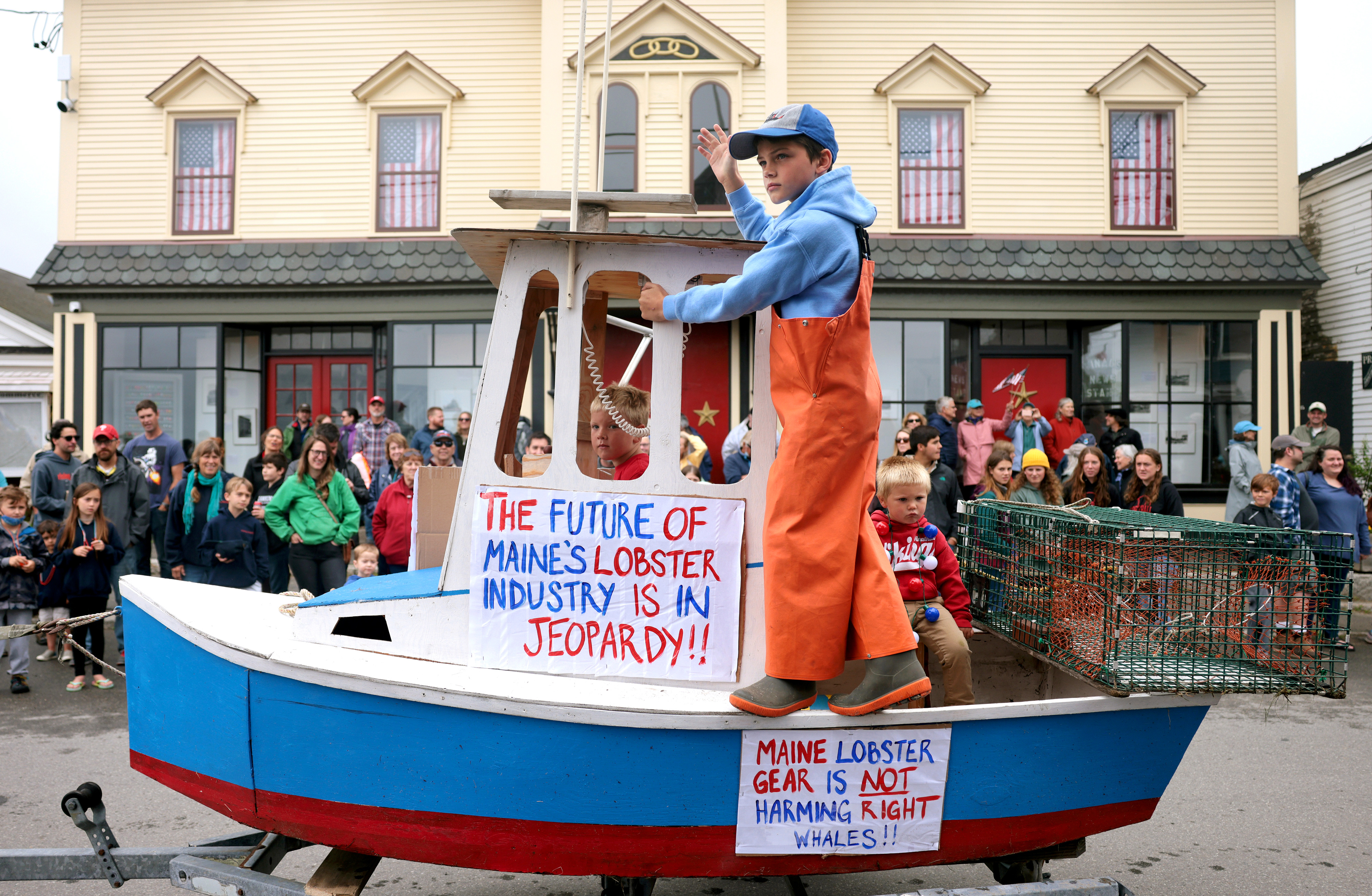
Young Jack has listened and learned from his mother. “This is a serious issue,” he explains to his Little League teammates as they line up before the parade. “I mean, it’s gonna be fun, it’s a parade, but I’ve got a message to get out there.”
A few miles away, at the floating science lab three miles off Vinalhaven, the sensors on Buoy F register a deep water temperature of 52.1 degrees Fahrenheit, the highest ever recorded on this date. Someday, decades or centuries from now, the street where this parade takes place might be gone, covered by the sea as it swells with all that slowly building heat.
But with summer in full bloom before them, the islanders focus on the promise of the moment. The price of soft-shell lobster is $6 a pound, as high as it has ever been this early in the season; McCarthy feels a surging confidence that he can cover his boat payments.
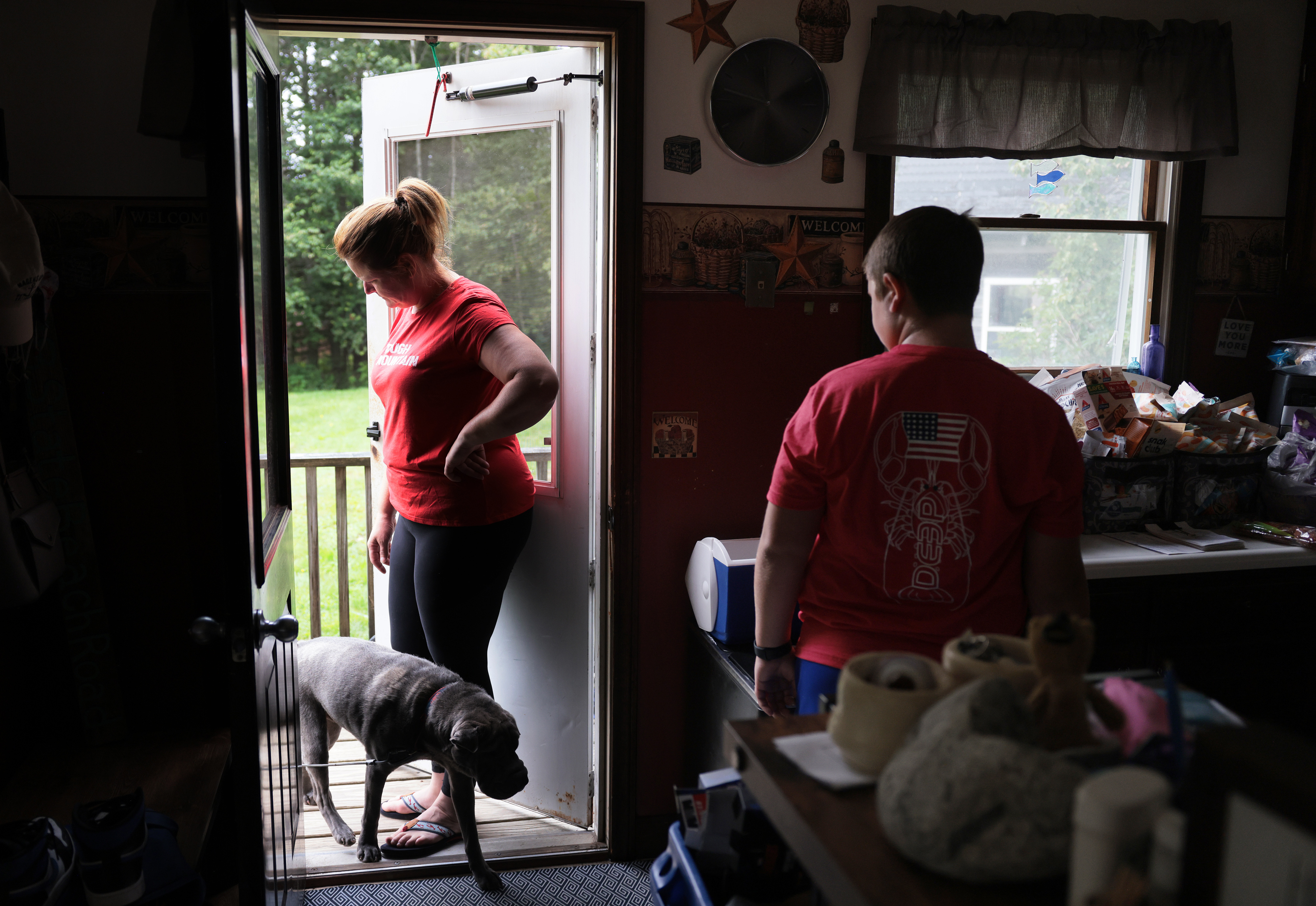
The high price lifts everyone around him. Across the street, where she watches the parade near the pie sellers in the parking lot, McCarthy’s sternman Barker beams when she spots his float, and the replica of the lobster boat where she spends her workdays. The work of a sternman (women favor the same masculine job title) is repetitive and taxing — pulling writhing lobsters from the dripping, hauled-up traps, tossing back the smalls, and snapping bands on razored claws — but McCarthy treats her well and pays her more than most other captains would.
She is grateful for the steady, year-round job. Before McCarthy came along and offered her a position on his boat, she never imagined buying a home, a place of her own to raise her 12-year-old son.
It is one more way that lobster binds them together, in one of the most fishing-dependent communities in the nation. Islanders of working age either fish or work in a job that supports the fishermen: fixing their boats or traps, or providing goods such as groceries or services such as healthcare or education to fishing families. There are no other jobs here — and nowhere else to go.
The business of lobstering extends far beyond them, to an interconnected web of wharves, wholesalers, truck drivers, and processors who distribute their catch around the world. That sprawling network adds $1 billion in statewide economic value, before counting the bait dealers, trap makers, boat builders, and repair yards that keep the fishermen on the water.
Kris Davidson, a seventh-generation islander whose parents once ran the island’s grocery store, remembers what her mother used to tell her years ago.
“She would always say, ‘Never forget that whatever happens there,’” — Davidson gestures toward the waterfront — “determines what happens here.”
Now the owner of two island businesses, she finally understands what her mother meant. They are all tied together, tighter than they know. They will all rise and fall on what happens in the ocean.
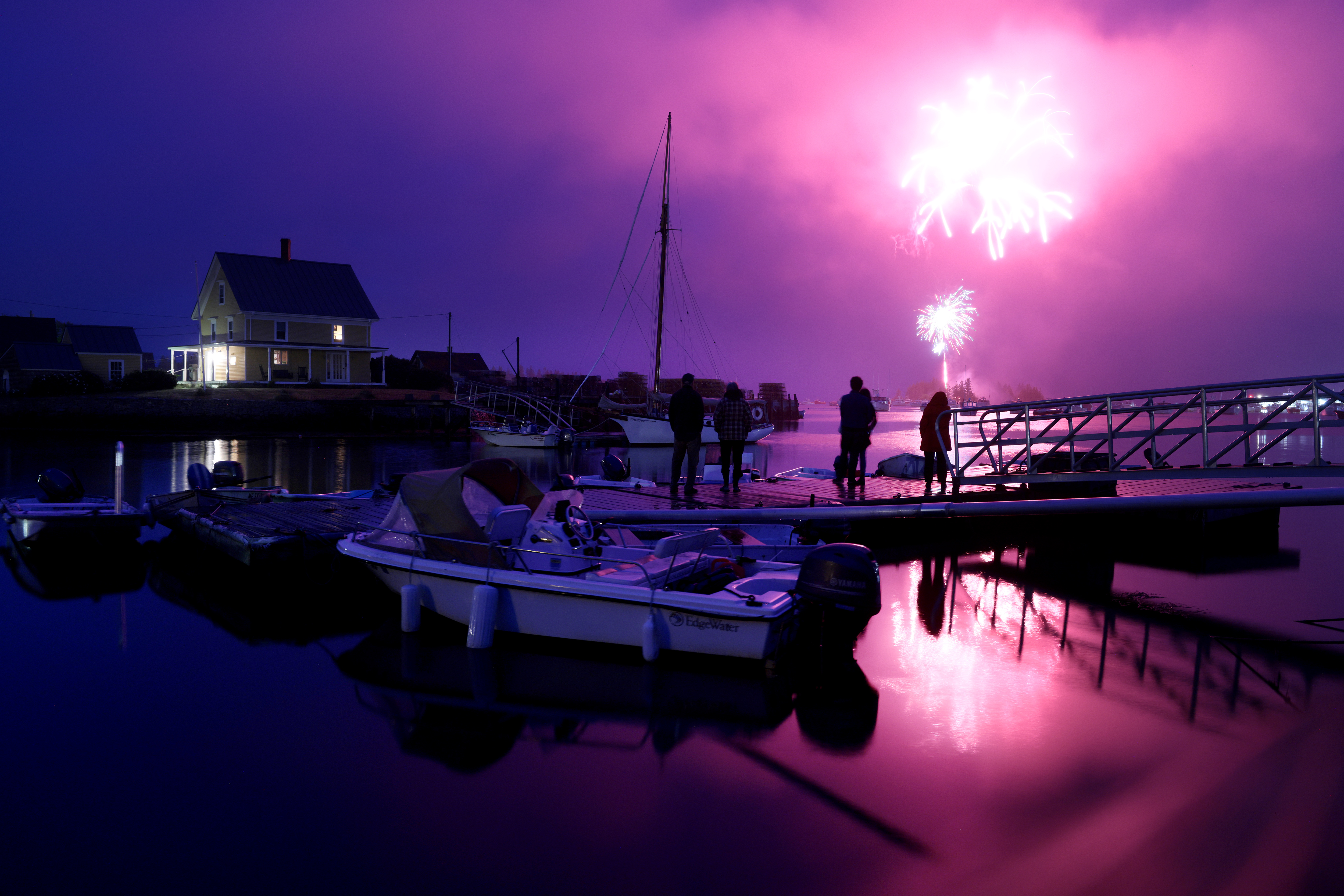
Tanner Lazaro settled into his classroom at the Vinalhaven School and steeled himself for another boring day indoors. As always, the 14-year-old freshman longed to be on his boat, hauling traps in the crisp and salty air. He loved the freedom he felt there, and the money he raked in — $40,000 in a summer, between hauling his own traps and Thompson’s, nearly as much as his teachers made in a year.
At the front of the room, teacher Dan Ganoza looked out at the class of six aspiring lobstermen. This was the skippers program, a class designed to teach students like Tanner the seamanship, science, and business skills to excel in their field. It was also designed to keep them from dropping out of high school, a constant risk with teenagers like Tanner who weren’t yet old enough to drive a car but already earned enough to make a living.
The teacher was new to Vinalhaven, a couple months into his first school year after six years at a high school in Colorado. A retired Air Force lieutenant colonel, he had just begun to understand the tensions on the island. His students in Colorado had not doubted that climate change is real; they had only wanted to know what they could do about it.
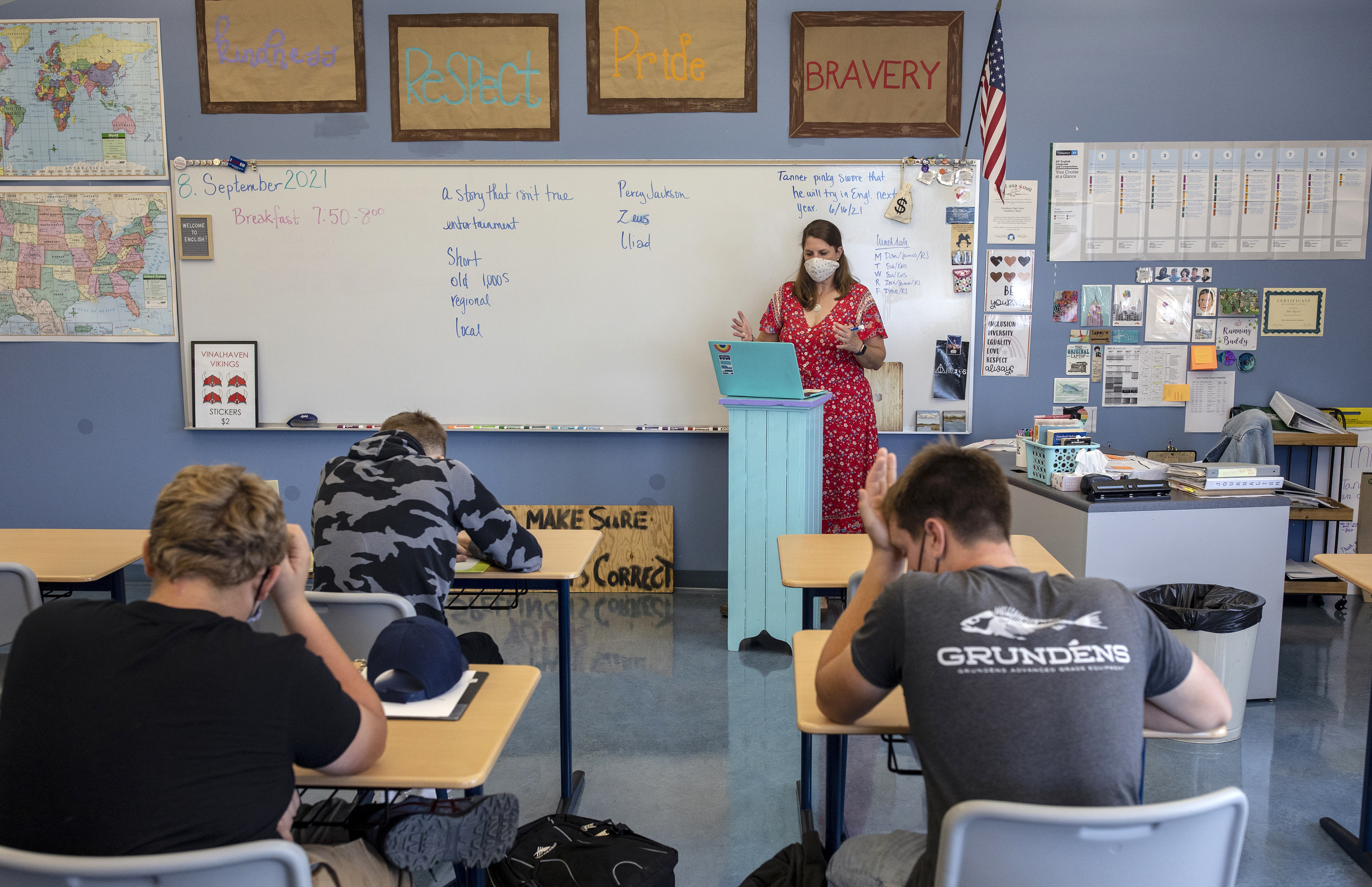
Vinalhaven was different. These students had never known a time when the island wasn’t riding high on record lobster harvests, when lobstering families didn’t have a work truck, a family truck, and a truck left parked at the ferry terminal for running mainland errands. They had no incentive to accept that their world was running headlong into an inconvenient truth.
“I’m trying to walk that line of being an advocate for my students, and for a way of life that I respect but frankly don’t know that much about, while also being true to science,” Ganoza said. “Sometimes, lobstering and science don’t mix that well.”
On this day in fall 2020, when the class discussion veered toward global warming, Tanner’s voice rang out from the second row.
“Climate change is fake news!” the young man said, drawing laughter from his classmates.
Ganoza felt a wave of discomfort overtake him: How could he do his job without this basic understanding?
Tanner grinned in his seat, a picture of teenage insouciance with his sun-streaked hair and the tall, orange rubber fishing boots he wore constantly. He liked the new science teacher, but could not resist the urge to make mischief. And it felt like being loyal to his mentor, Frankie Thompson, when he challenged the teacher’s belief in climate change.
If pressed, Tanner would acknowledge that the posters on his classroom wall were probably correct: The Earth is warming. But he stopped short of blaming human beings for the change. It was a way to hedge his bets and keep the peace, on an island that demanded complex systems of belief.
Tanner had idolized Thompson since he was a young boy, when their families were briefly connected by marriage. Tanner’s own father had drifted out of his life, and Thompson embraced the role of surrogate. At home and at school, Tanner was mouthy and rebellious. But when Thompson spoke, Tanner always listened.
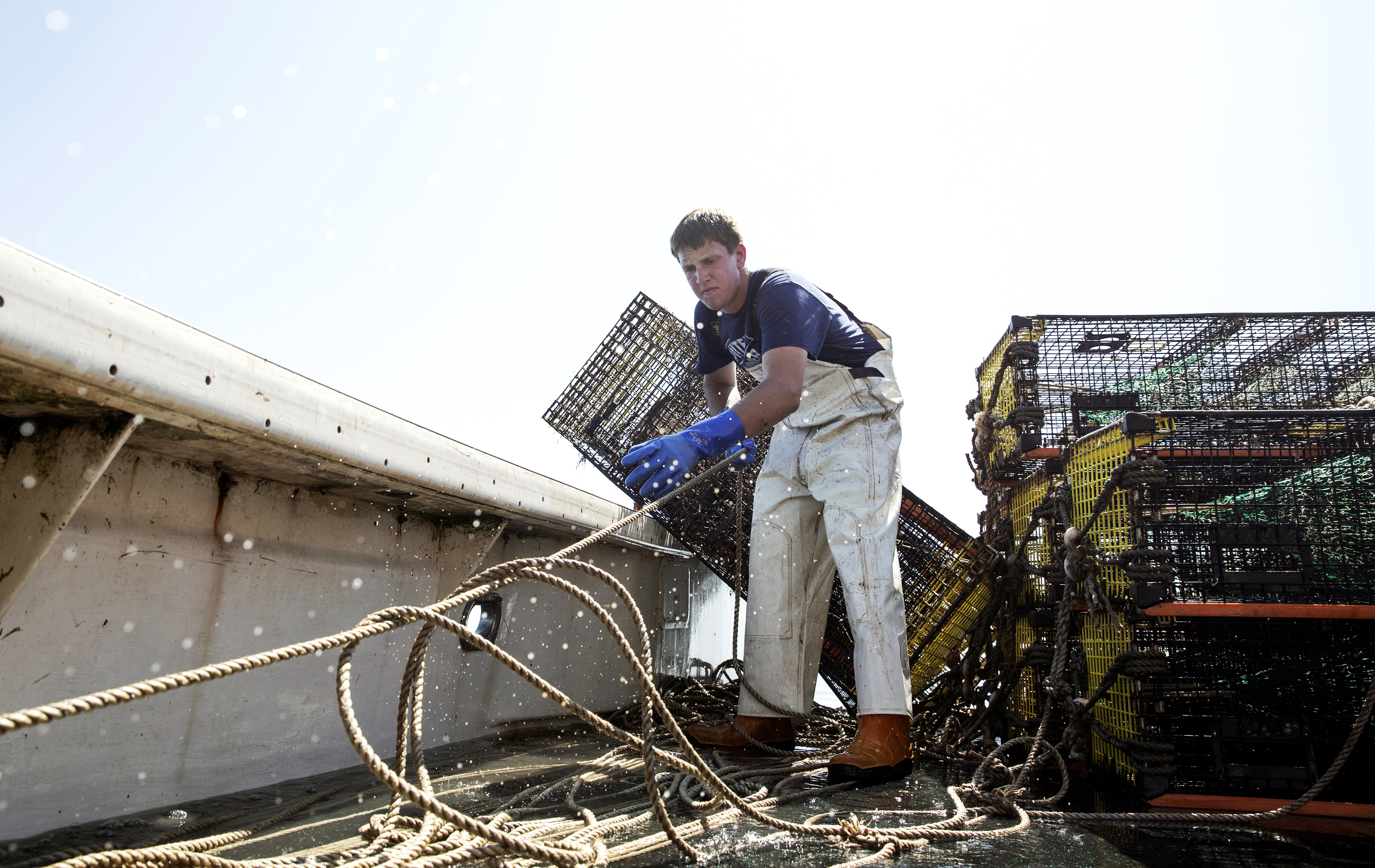
As a boy, Tanner had built a LEGO model of Thompson’s boat, Obsession, with tiny flourishes that matched reality: the below-deck lobster tanks, the wide deck for stacking 25-trap trawls, the boat’s name inked in black marker on the hull. He kept the model on a shelf in his room for years.
Now he works aboard the life-sized version as a sternman, helping Thompson set his 70-pound traps in deep offshore waters. Other days, Tanner works at Thompson’s lobster-buying station, hauls his own traps on his own boat, or fishes as an extra hand with anyone who needs one.
He is like a different person on the water: the last to take a break or head home after a 12-hour shift; the first to start cleaning slime off old buoys while others goof off or eat lunch.
“Lobstering is all I’ve ever wanted to do,” the teenager said one morning while out on his boat setting traps. “It’s the freedom part of it, the being my own boss part, that I love. I will work hard at something if I think it’s important, if it’s interesting. School’s boring, but lobstering’s not.”
Newsletter: The Globe Investigates
Sign up to recieve Spotlight reports and special projects in your inbox
He sang along with the song blasting on board while he worked, an upbeat rap reggae anthem called “Vacation” that ranked among his favorites: “Ay, ay, ayyy ... I’m on vacation, every single day ‘cause I love my occupation…”
Unlike many of his friends, who are sons of successful lobstermen, Tanner is estranged from his lobsterman father. There will be no new boat handed to him on his 16th birthday, no lobster dynasty awaiting. His mother worries what will become of Tanner if lobstering takes a downturn. For a kid like him on Vinalhaven, there is little else.
He has made impulsive buys with his hefty earnings — an all-terrain vehicle; a top-notch video game system; a closetful of hunting guns; a truck that he is still too young to drive — but he has also learned that lobstering is a rugged business, rife with unexpected hazards and expenses. He has had to sell off some of his toys to finance major fixes or equipment, and has learned to do his own routine repairs, seeking advice from almost any fisherman willing to help.
“What that boy needs is a father to teach him how to be a man, but the least I can do is teach him how to be a better fisherman,” said Thompson, who remembers his troubled relationship with his own lobsterman father, who did little to help him build his career.
Thompson knows the future of the fishery matters more to Tanner than it does to him. Older, well-established lobstermen can retire if they have to and live off their savings. Tanner can’t.
Grappling with the island’s contradictions, Tanner’s teacher, Ganoza, sees a confounding disconnect. No one is better positioned to recognize environmental change than experienced fishermen: They have lived through a historic lobster boom, and they know something must have caused it. That thing is climate change — the ocean warming that created an ideal lobster habitat in their waters. Yet they avoid linking their success to climate, instead referring vaguely to “something changing” in the ocean as they sip coffee at the island diner or stand in line at the grocery store.
As humans will, they focus instead on other concerns, those that seem like more immediate threats — the territory closures, the wind turbines, the ropeless fishing gear — turning a blind eye to the climate forces that have set the long, slow collapse in motion.
“They believe lobstering will always be there for them,” said Ganoza. “They don’t see that as a climate thing. They don’t see the big picture, the connections. Not yet.”
To help his students see the connections, he gives them an assignment: They will keep three lobsters in three classroom tanks and figure out which conditions the crustaceans thrive in.
Two lobsters die before the class cracks the code. The oxygen level in their tanks, the students realize too late, was too low — one side effect of warming water.






Jonathan Smith leans against his gray Subaru wagon, pulls off his shoes and socks, and wades barefoot into the rushing tidal surge that sluices sideways across the surface of North Haven Road.
He leaves his car headlights on, the high beams cutting through the dark night to illuminate a tall gauge beside the road. At two minutes after midnight, Smith points his cellphone camera at the numbers and photographs the water’s highest peak at this high tide: 11.1 feet.
“I’ve never seen it like this,” he says as the water soaks the bottom edges of his pants.
Every month when the tide is at its highest, Smith and a half dozen other islanders — members of Vinalhaven’s Sea Level Rise Committee — fan out across the island to document the height of the tidewater. Established by the town to help prepare for its uncertain future, the committee seeks to track the pace of rising seas and to raise awareness about potential consequences.
Warming oceans will one day drive down the supply of lobsters in the waters off Maine’s coast, though no one knows exactly when, or by how much. But the threat to Vinalhaven’s low-lying Main Street is much clearer: Even under the most conservative projections, islanders will lose one third of the buildings in the next 30 years.
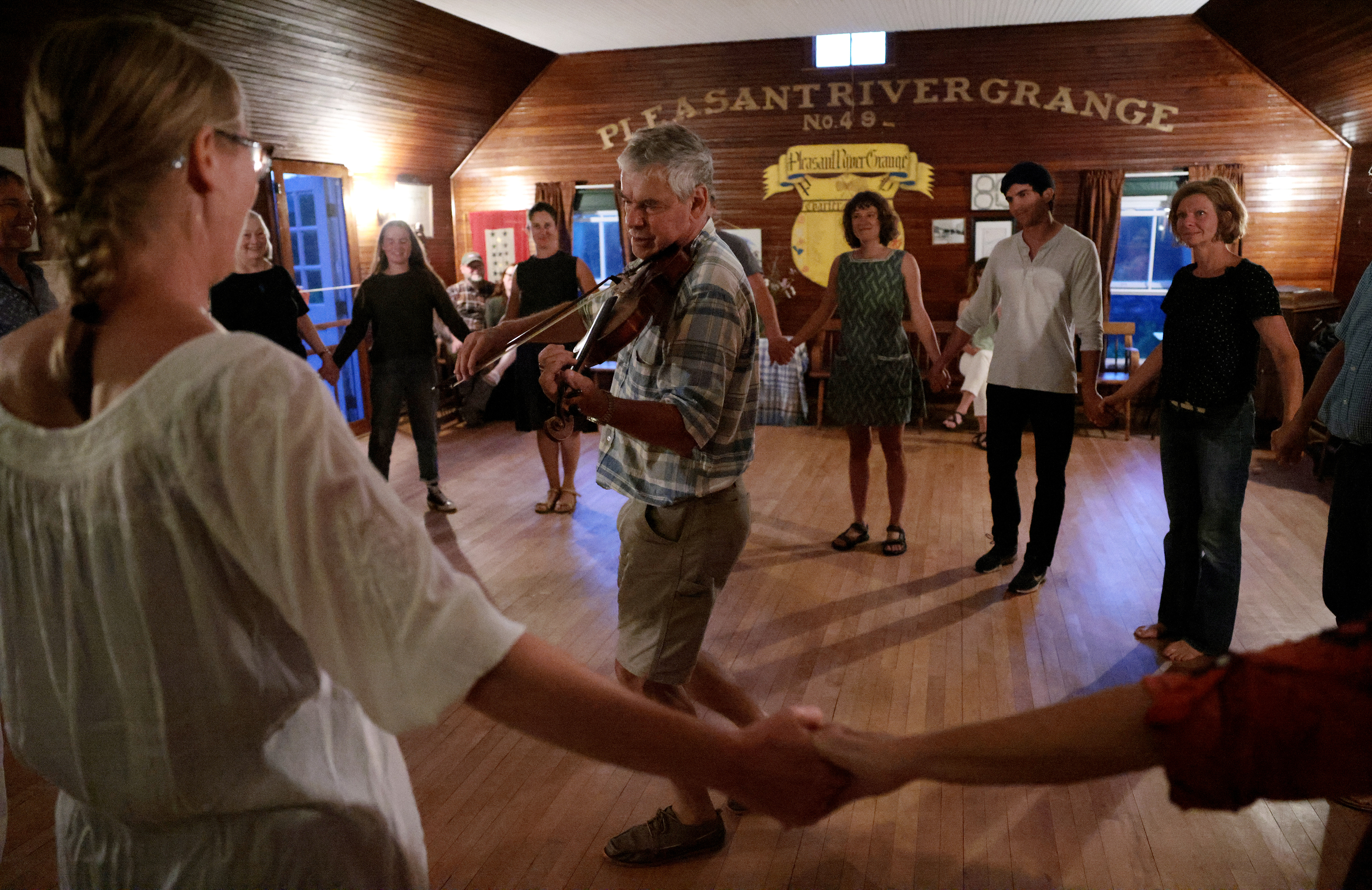
“A lot of places are affected by climate change, but not all of them have a Main Street sitting on a pile of rocks that are going to be underwater,” said Linnell Mather, a leader of the Sea Level Rise Committee and the executive director of the Vinalhaven Land Trust.
Once lined with hotels and department stores, a bowling alley and a movie theater in the heyday of the island’s granite quarries, Main Street is still the beating heart of this small community, a critical thread in the fabric that binds them together. Here, fishermen catch up, side by side in their idling trucks, under the granite eagle statue that overlooks the village. Nearby stands the elegant and imposing Star of Hope Lodge, a historic Victorian hall that was the longtime home of artist Robert Indiana.
Four years ago, when the sea level committee organized its first community-wide brainstorming sessions to consider solutions for the Main Street problem, some of the proposed ideas caused a minor sensation. Islanders reeled at the idea of moving the village to higher ground or raising up the entire street.
Since then, the committee — composed of mostly year-round residents — has forged ahead, chipping away at a long list of grant-funded initiatives and winning praise statewide for its proactive, homegrown approach.
On the island, though, it still faces pockets of resistance. When the Island Institute released a 12-minute mini-documentary about sea level rise on Vinalhaven this summer, some residents were upset, fearing that publicity about the problem would drive down property values.
“Most people accept what’s happening, but there’s a grief process you have to go through,” said committee co-chair Yvonne Thomas, a former counselor at Vinalhaven’s school. “Denial is part of the process — it’s a very natural human reaction.”
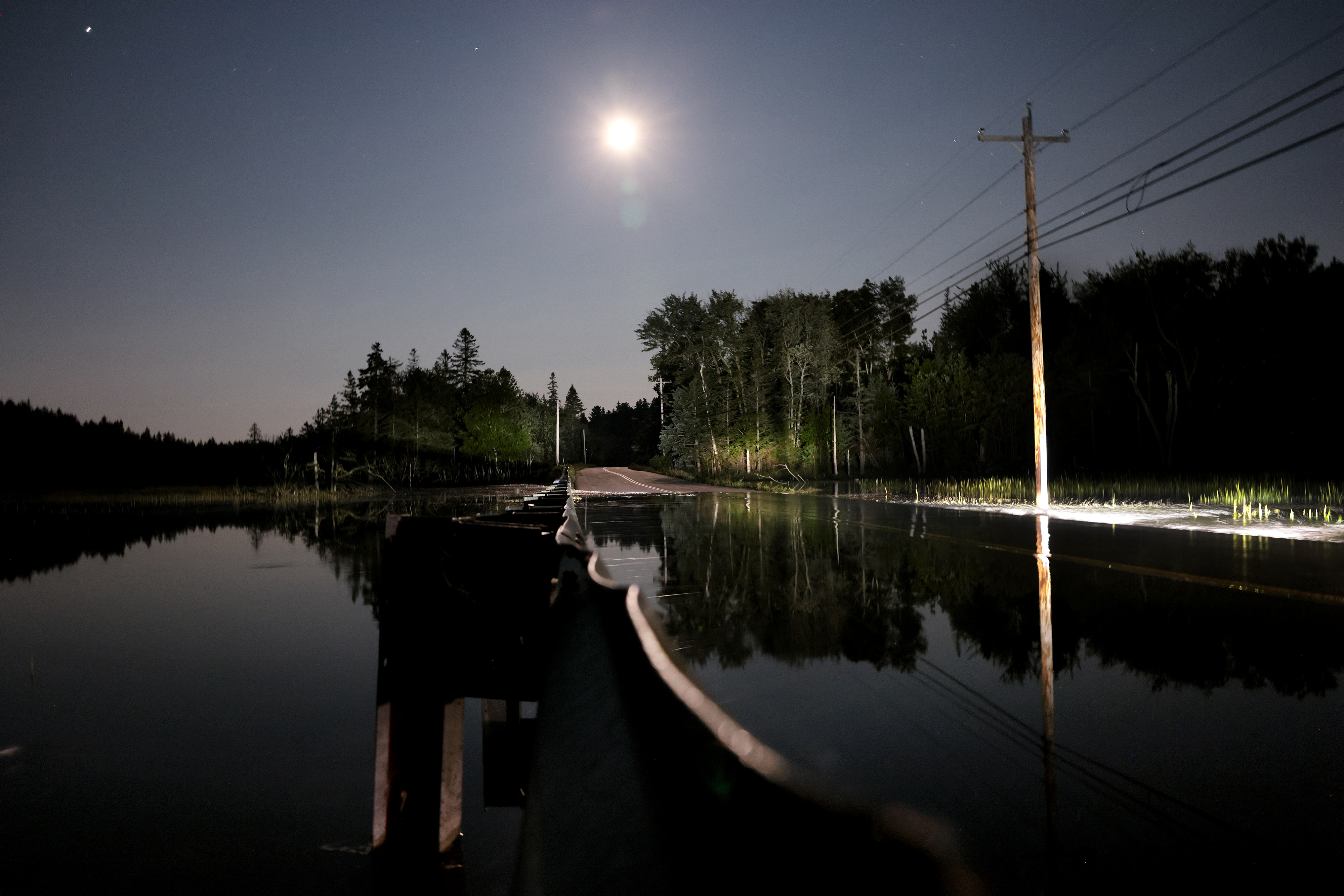
Smith, the tracker who braved the tidal surge on North Haven Road, is a newcomer to the island, a retired science teacher who spent decades living in Alaska, watching as the glaciers there grew smaller every year.
Standing under a moon tinged faintly red on this July night, incredibly enough, by the smoke from distant California wildfires, he watched as a car stopped on the flooded road, slowly turned around and headed back the way it had come. To help bring more islanders on board, the Sea Level Rise Committee has emphasized the importance of passable roads for emergency medical workers.
The flooding on this road results in part from engineering flaws, a smaller manmade problem that is much more easily solved. But it is also emblematic of worldwide forces causing seas to rise two ways: when new water volume is added from glacial melt and when warming water molecules expand, taking up more space and swelling ocean levels.
The science is simple, but often hard to see. So when Vinalhaven’s school is in session, the tide trackers sometimes bring students with them. There is no shrinking glacier here, no raging wildfires. But this rushing, rising water is reshaping their own island, and that has an urgency no textbook can convey.
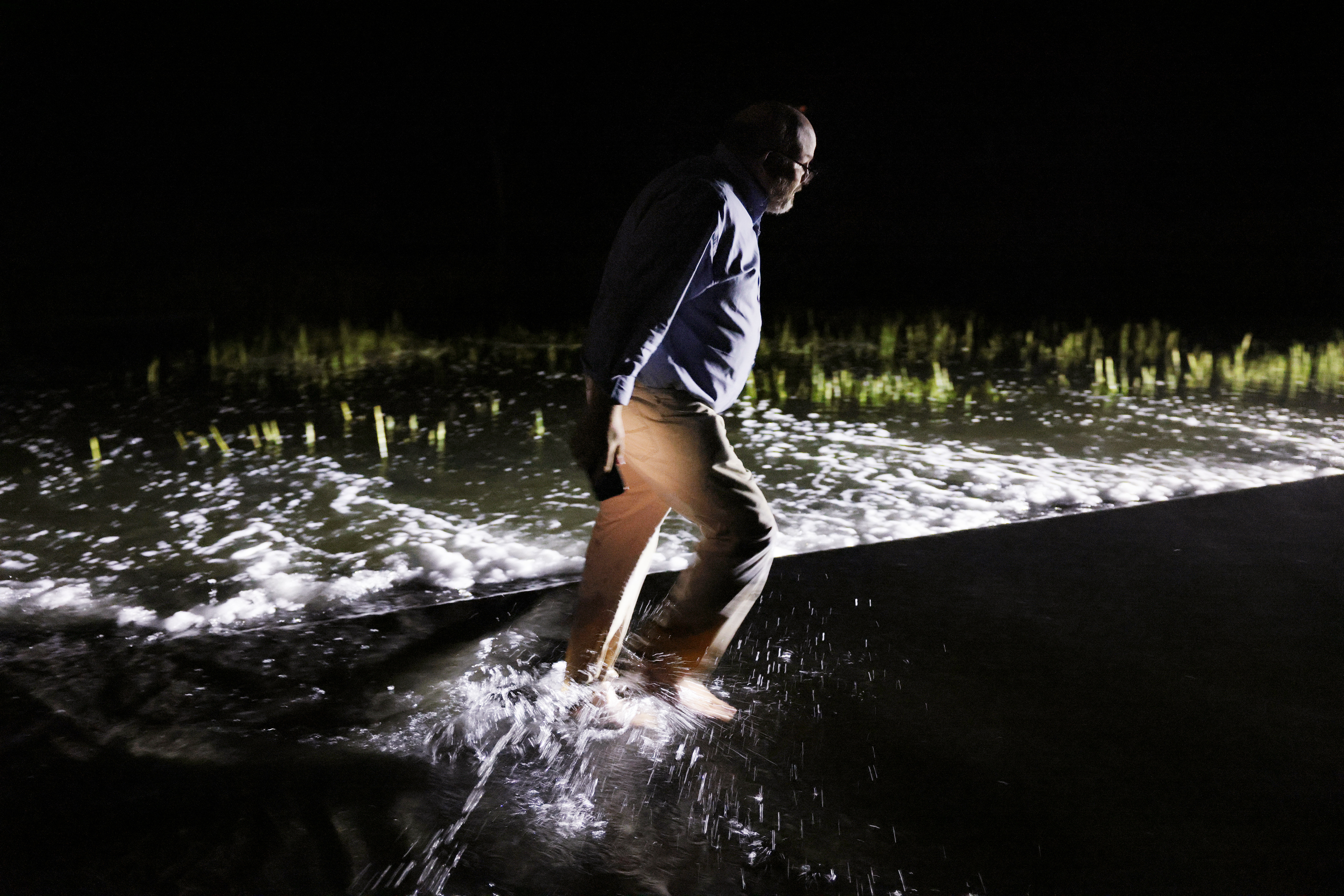
The morning after McCarthy brought his new boat home, in late July, the island awakened before dawn to find her tied up at the co-op dock. Bright safety lights overhead sharpened the outlines of her broad, white cabin, four windows wide, and the gleaming white face of the compass boldly painted on her prow.
Passing sternmen honked their approval. Dockworkers shook McCarthy’s hand. His cousin, veteran lobsterman Steve Rosen, climbed aboard while waiting for his morning load of bait. “You’ve got yourself a beautiful boat, Johnny,” Rosen said in a soft voice as he ran his hand over the unblemished side rail. “She’ll work hard for you.”
The journey home to Vinalhaven had faded quickly into memory, the new-boat thrill giving way to workaday concerns. McCarthy glanced over at the rain-streaked price board on the co-op’s float shed. He could just make out the shedder price — a record $7.35 per pound still holding.
The crew readied the vessel, which McCarthy had christened True North, for its first fishing trip. Barker, the sternman, stocked the bait box with redfish and pogies and marveled at the width of the broad, unsullied deck, eight steps from rail to rail. That width will mean the most in winter, far at sea, when it gives the heaving vessel more stability.
If they can still fish those distant waters. If the government doesn’t shut them down, come fall.
McCarthy can’t dwell on those questions now. All he can do is fish hard, and wait and see.
Just before the sunrise, they headed out to sea.
“I’m tired of spending money,” McCarthy said. “It’s time to make some.”
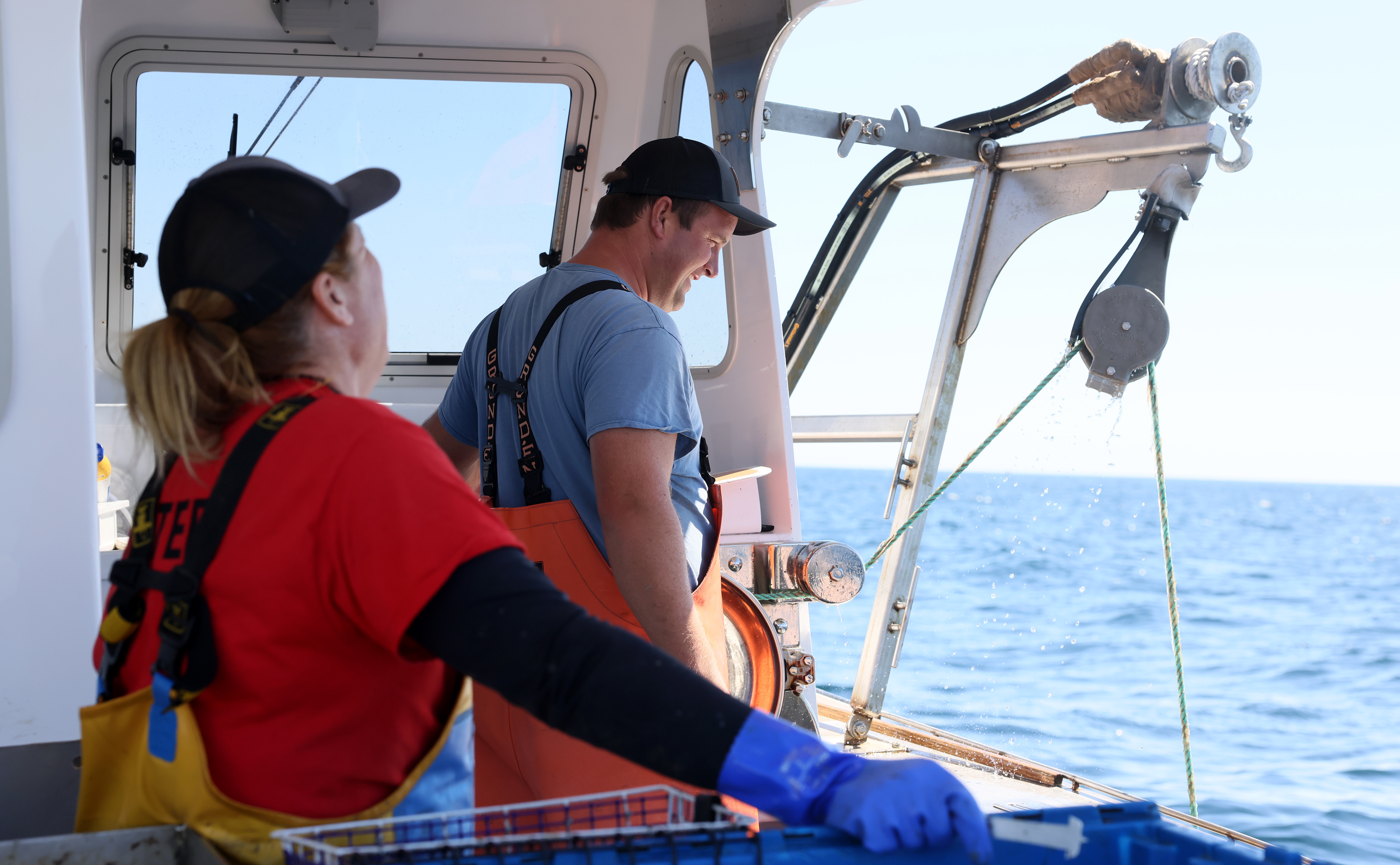
The news hit like an earthquake, throwing everything into question: Frankie Thompson, Vinalhaven’s most vocal champion, had unexpectedly put up for sale the largest of his boats, Obsession, through a Facebook post. As word spread up and down the coast in early July, worried lobstermen asked: What does it mean if Frankie T. is getting out already?
Then a second thunderclap shocked the island. Thompson had suffered a heart attack, just days after listing his boat. A helicopter airlifted him to the region’s largest hospital in Bangor, where he learned that one of his arteries was almost completely blocked.
There was no connection between the events. But the potent combination fueled a wave of dread.
Tanner, now 15, was stunned by this turn of events. He cannot imagine a world without Thompson in the captain’s chair, dispensing critiques, teasing, and wisdom. The man has always seemed unmovable; even on land, Thompson stands with his feet spread far apart, planted in a way that lets you know he isn’t budging.
The pumped-up asking price for the boat suggested that Thompson didn’t really want to sell it: $1.8 million for the vessel, 800 traps, and his federal fishing permit. And no, Thompson confirmed, he didn’t want to give it up. But he couldn’t keep fishing while doing everything else, running his family’s lobster-buying business and fighting endless battles as a union leader.
“Fishing is all I’ve ever wanted to do, but it’s not always about wanting. Sometimes it’s about what’s needed,” he said. “It just feels like something’s gotta give.”
The last few months had been hard, and he was tired. He struggled to find and keep workers for his business on the dock, and he helped the union cope with internal upheaval. He fielded frequent phone calls with other union leaders to assess what needed their attention first: the wind developers who want to impede their fishing grounds, or the whale-saving environmentalists hell-bent on stripping the rope from their traps.
Within a week of his heart attack, though, Thompson was out of the hospital and back on the waterfront, hoisting frozen bait boxes and scrambling up and down ladders. He went back to hassling Tanner as they hauled traps side by side, his return to routine reassuring the young man that his place on Thompson’s boat, his whole world, would stay intact, at least for a little while longer.
“I’d like to see ‘em stop Frankie,” Tanner mused, his relief evident in his tone. “Lots of people have tried. ... The government thinks it’s gonna be the one to break him? Not even a heart attack could keep that stubborn [man] down.”
There had been nibbles from interested buyers, but no serious offers on the boat. For now, Thompson held onto what he had. Like everybody else, he would have to wait and see.
It is Thompson’s unflagging persistence, in the face of multiplying threats, that lets fishermen believe they can prevail.
They don’t let themselves imagine what might happen if even he isn’t strong enough to fight.
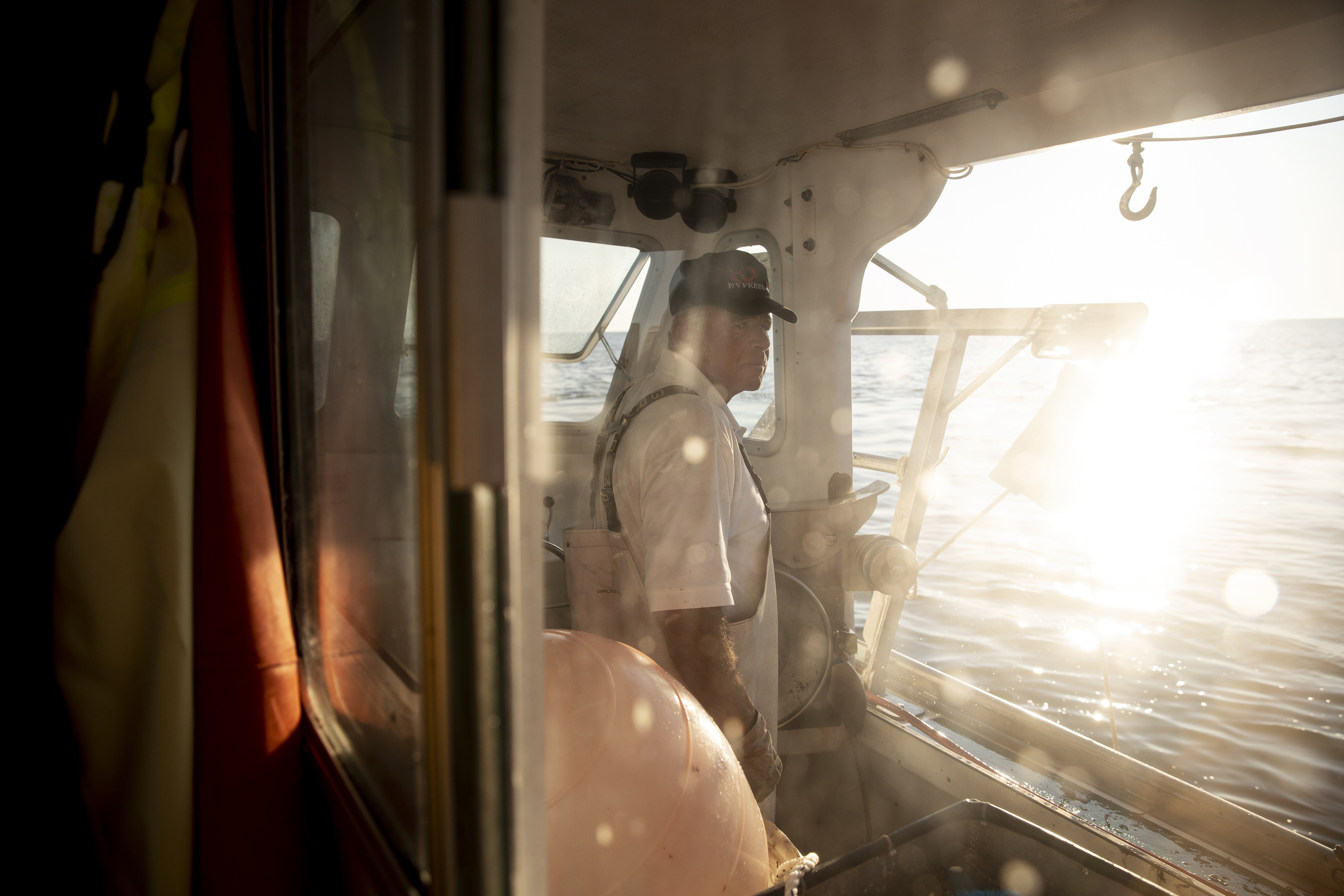
Far beyond the coast of Maine, other industries are already grappling with devastating changes brought about by global warming. California rice farmers are squeezed by more frequent droughts. Midwestern dairy farmers scramble for fans and mists to cool down their herds, whose milk production plummets with soaring temperatures. Lumber companies are decimated by wildfires, mining companies by floods.
And a slew of new reports in recent months say hope is dimming. In August, the United Nations found that world powers have failed to meet their goals for cutting greenhouse gas emissions, which continue to climb, in spite of leaders’ global pacts to rein them in.
The crisis demands reinvention on an almost unimaginable scale.
Those who know Vinalhaven’s history say it is a place made for adaptation: For centuries, these hardy Mainers have survived by facing up to change.
When steel and concrete overtook granite in construction, and shut down Vinalhaven’s once-thriving quarries, islanders adapted and set their sights on fishing. And when cod and haddock stocks collapsed at the end of the last century, an early harbinger of climate change, they faced another reckoning, and turned to lobster.
Some feel certain they can reinvent themselves again.
“They can use their ingenuity,” said Belknap, of the Island Institute. “That’s what fishermen do.”
Dorr, the town manager, agrees. The senior fishermen on the island remember a time before lobster was everything, he said, a time when fishing was diversified, and they earned their income from various sources. It’s the younger generation that struggles to imagine it; the climate-driven lobster boom is all they know. “The old guys say it’s always changing,” Dorr said. “But the last 20 years have changed expectations.”
Dorr is still reeling from a fresh setback in his efforts to ensure the island’s economic future. A plan he started working on five years ago, to bring high-speed Internet service to the island, was abandoned in June after residents judged the $5 million price too high.
Dorr saw the investment as critical to a more diverse economy, one that depends less on jobs in fishing. And he worries what the outcome might foretell about the island’s capacity for change.
As September drew near, and Vinalhaven braced for the new whale rules, Dorr was still working on his plan to acquire and test ropeless fishing gear. He thought about who he could ask for help, which fishermen share his own practical bent. Maybe he could partner with the lobster co-op, to help open minds to new possibilities?
It will only take one fisherman, one willing renegade, to make an island’s reinvention seem possible, again.
At the end of August, a powerful hurricane swept up the East Coast, aiming north toward Massachusetts and the coast of Maine. Meteorologists worked themselves into a frenzy at the possibility of a direct hit.
In the end, the storm named Henri weakened and struck Connecticut and Rhode Island instead. On Vinalhaven, its wake was barely felt. Some islanders took a special solace in the outcome: See, the so-called experts, wrong again. Why would anyone believe anything they say?
They have dodged the worst of it, for now. But another threat is on the horizon, long in the making. And this time, it seems certain, they won’t be as lucky.
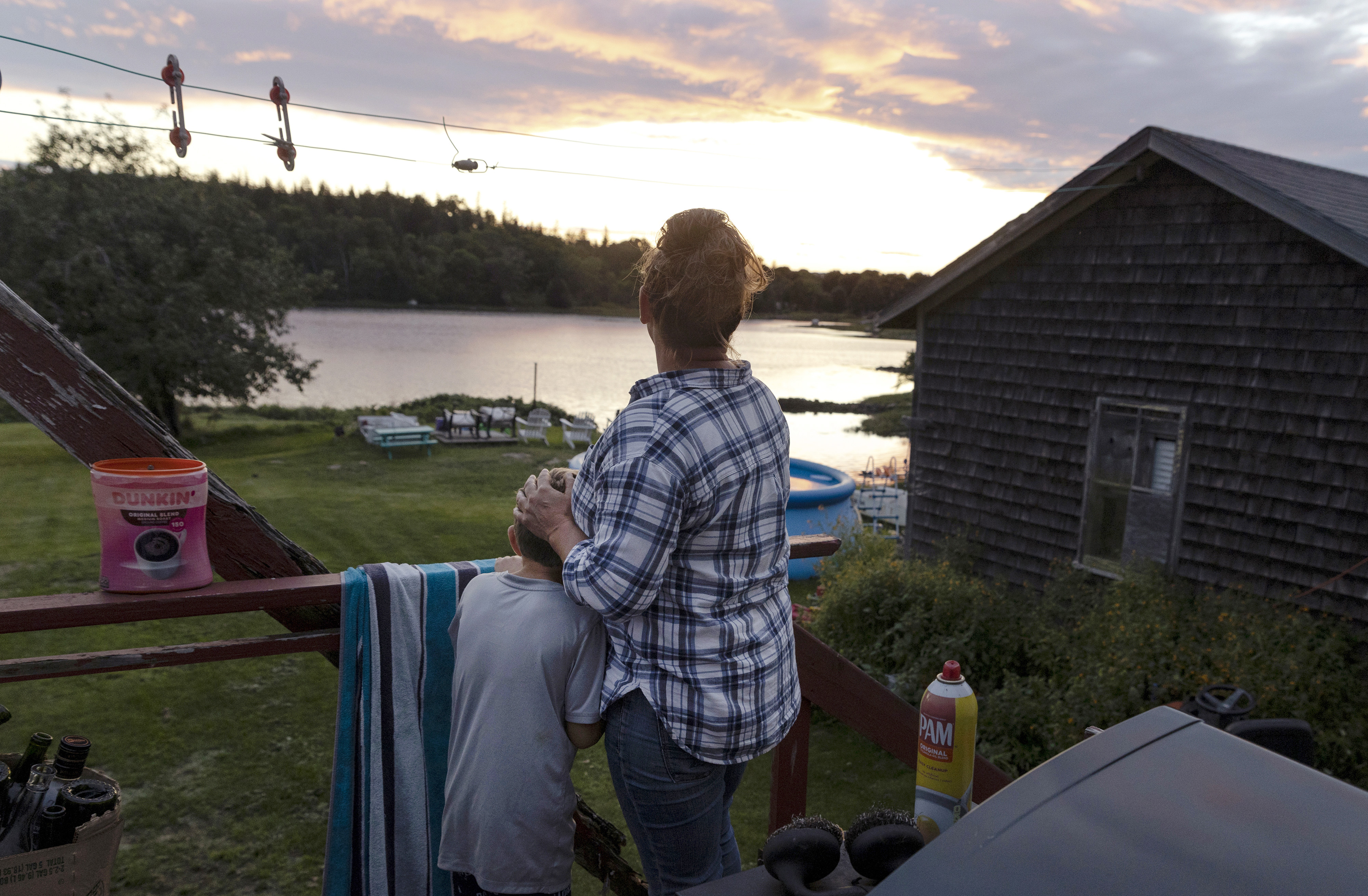
“The Lobster Trap’” is a project of the Spotlight Fellowship program, funded by Participant, co-producers of the movie “Spotlight.”
Credits
- Reporters: Penelope Overton, Jenna Russell, David Abel
- Photographers: Jessica Rinaldi and Brianna Soukup
- Editors: Brendan McCarthy, Scott Allen, Mark Morrow, Steve Greenlee, Jason Tuohey
- Design: Ryan Huddle, Matt Fulton
- Homepage & app: Yiqing Shao, Leah Becerra, Lauren Booker
- Developers: Daigo Fujiwara, John Hancock, Vince Dixon, Todd Dukart
- Graphics: John Hancock and Vince Dixon
- Photo editors: William Greene, Michele McDonald, Leanne Burden Seidel
- Video producer and editor: Caitlin Healy
- Copy editors: Mary Creane, Michael Bailey, Brian Robitaille
- Social media: Christina Prignano, Devin Smith, Maddie Mortell, Katherine Lee
- Analytics & engagement: Karla Ovalle
- SEO: Cameron Muir
- Newsletters: LaDonna LaGuerre, Emma Kelley, Marie Princiotto
- Quality assurance: Jackson Pace
© 2022 Boston Globe Media Partners, LLC
